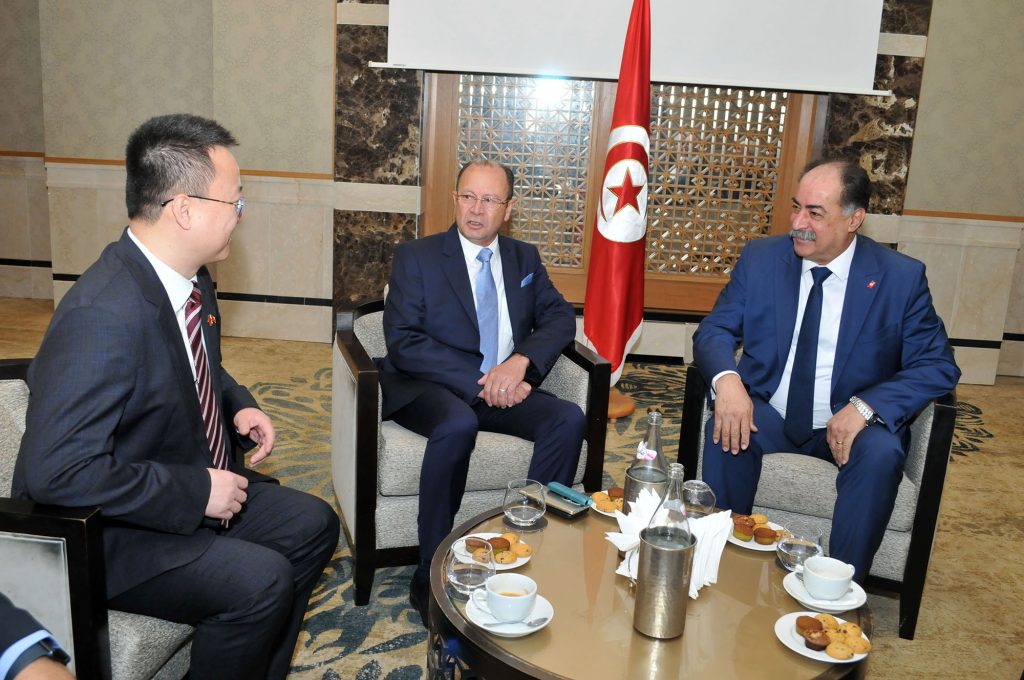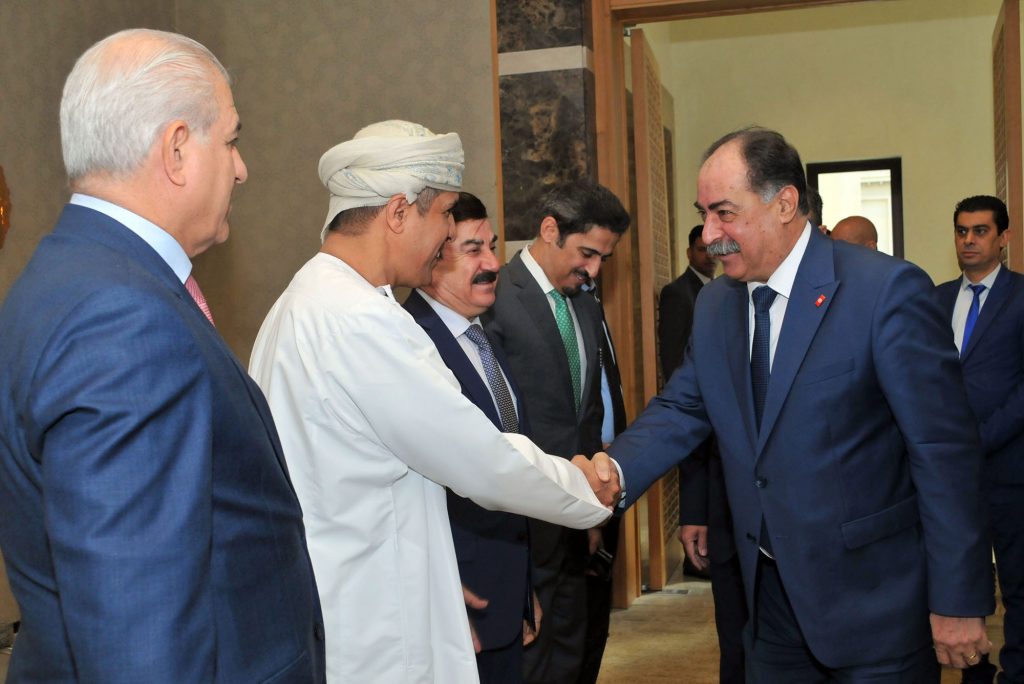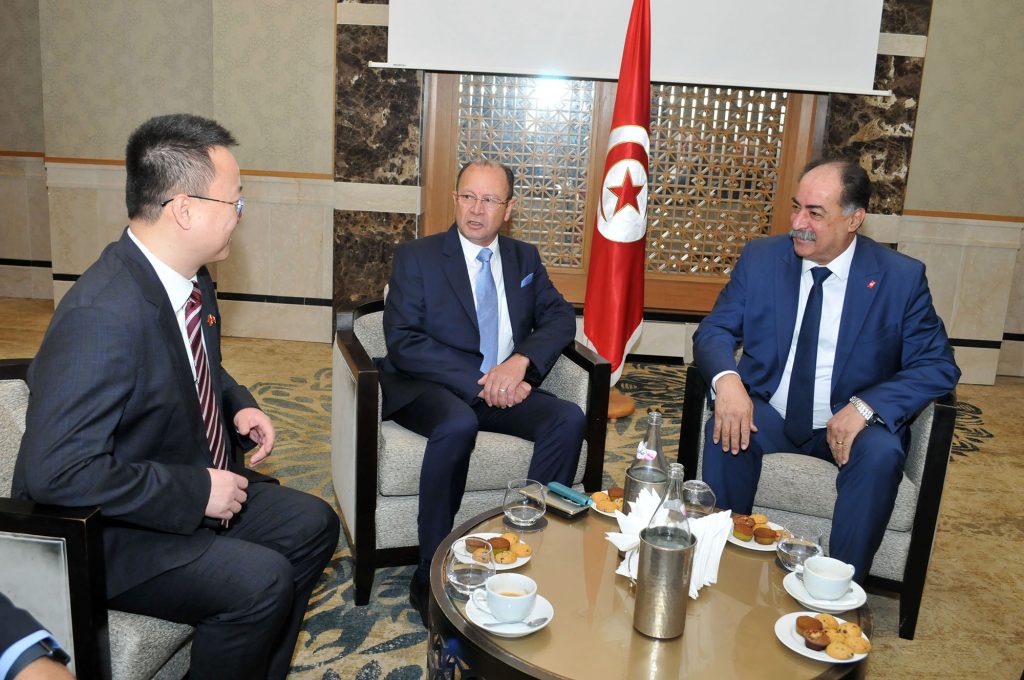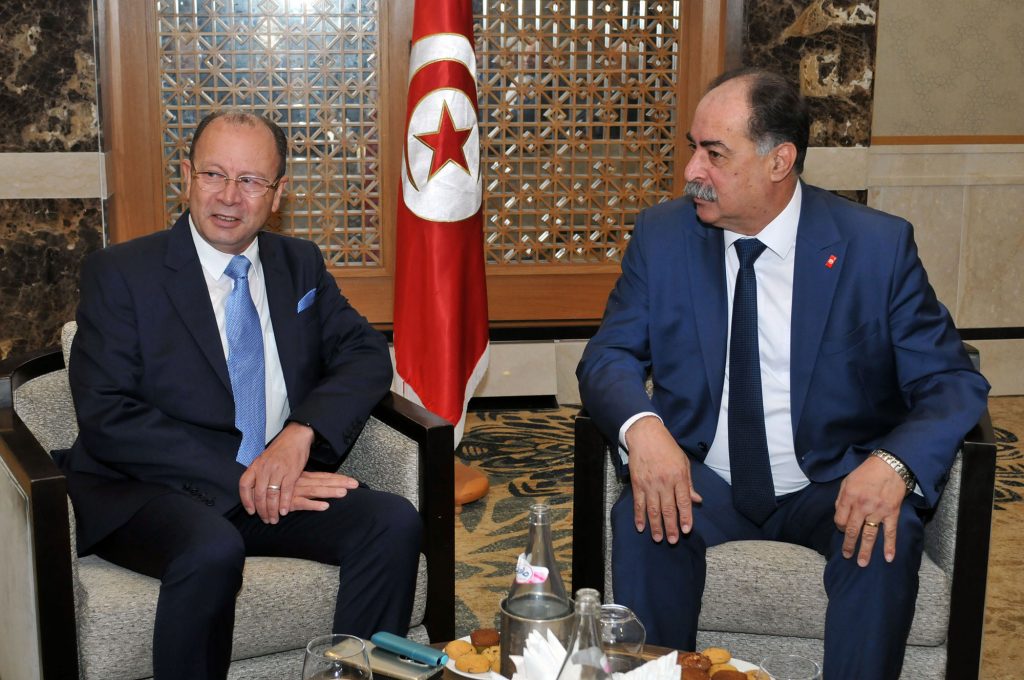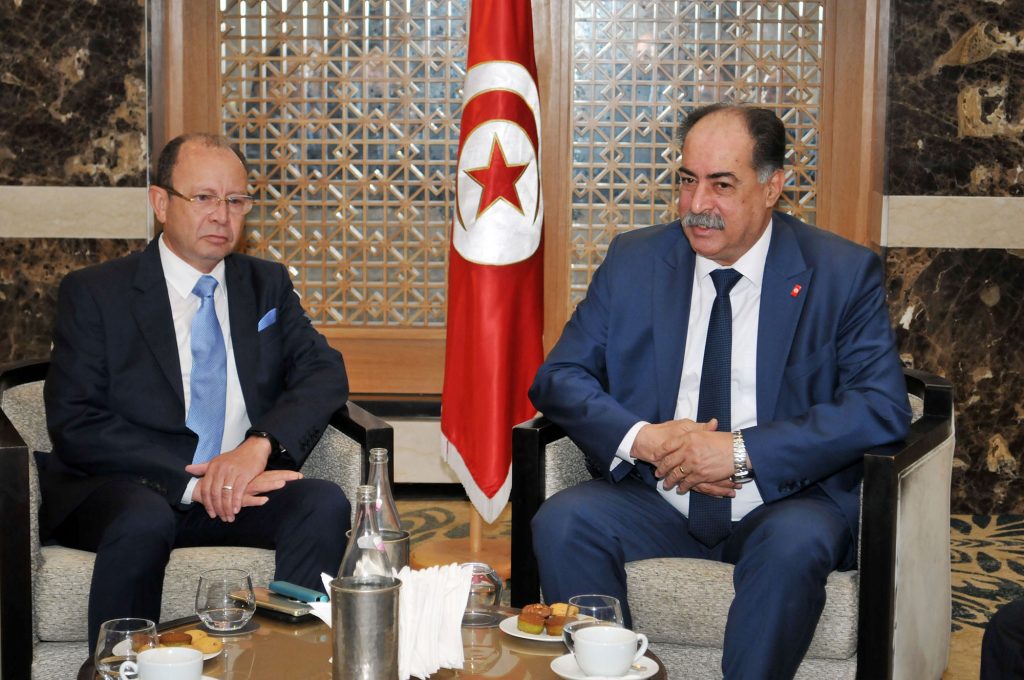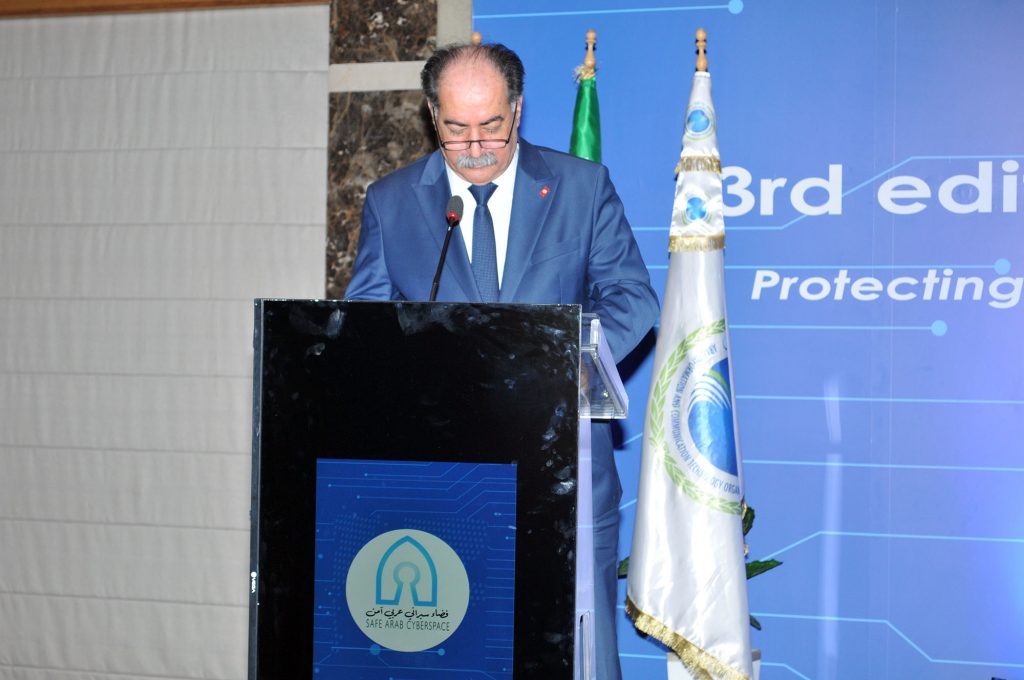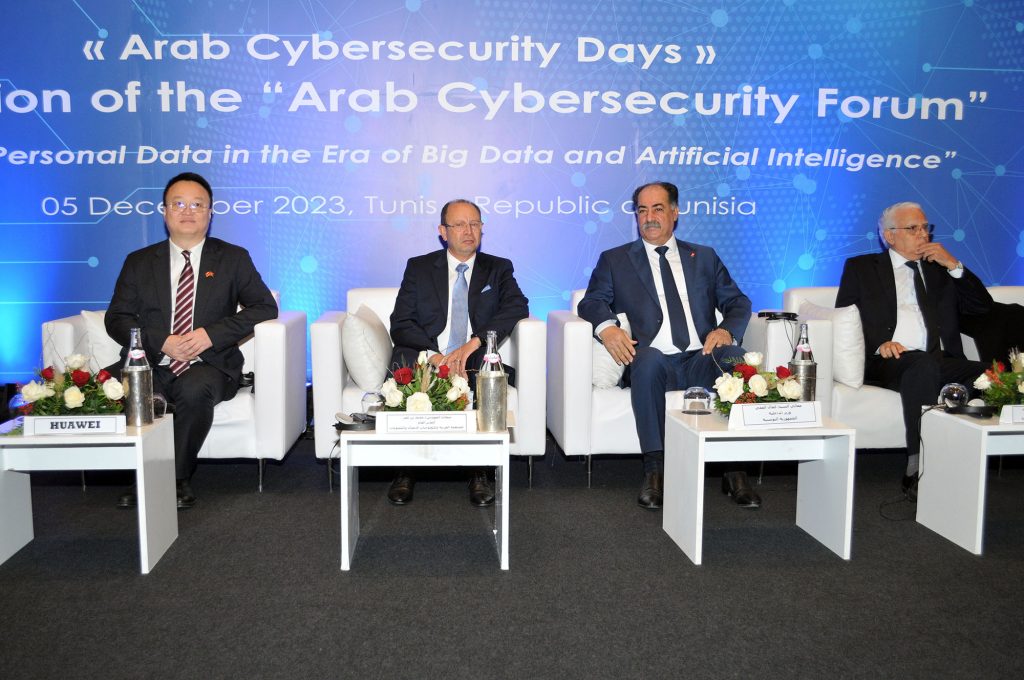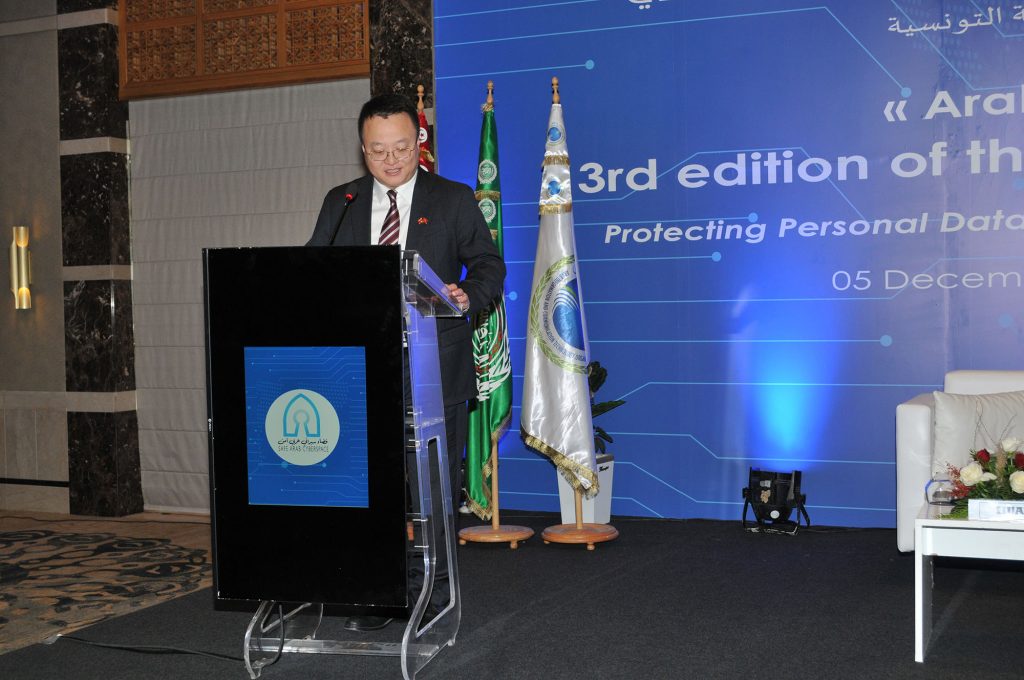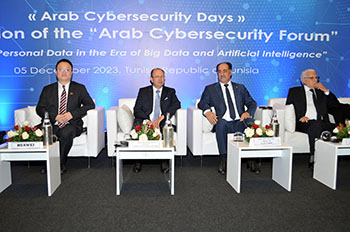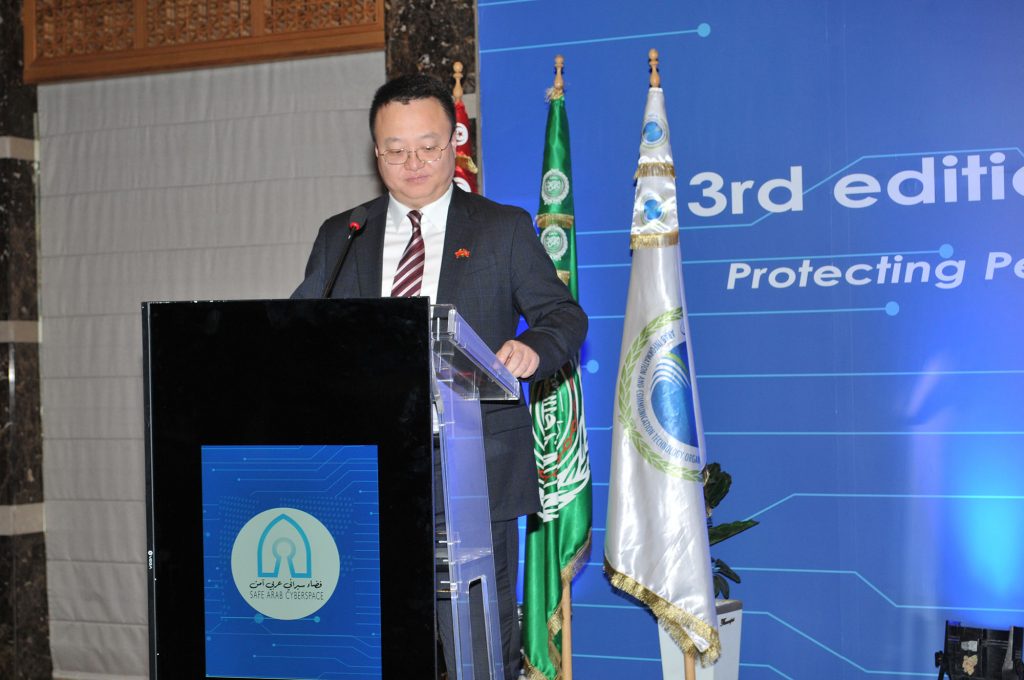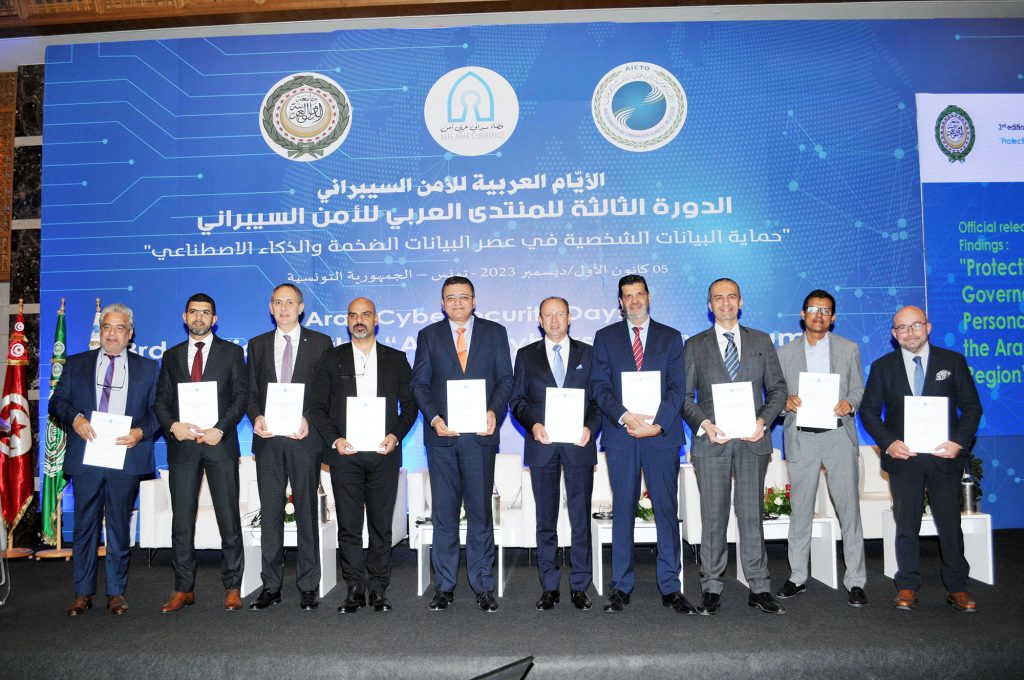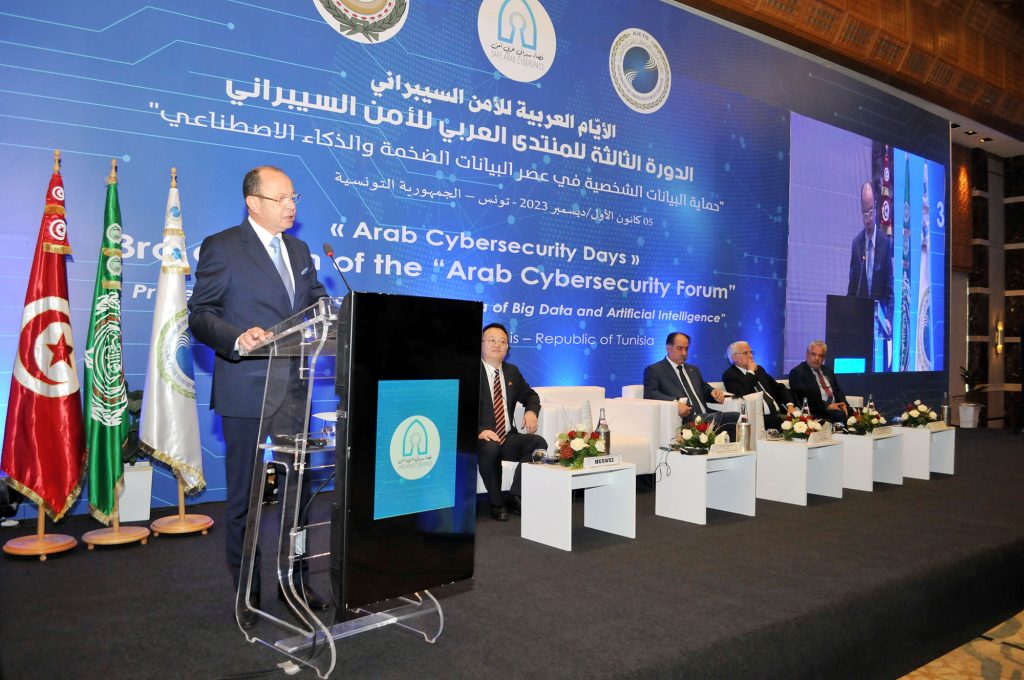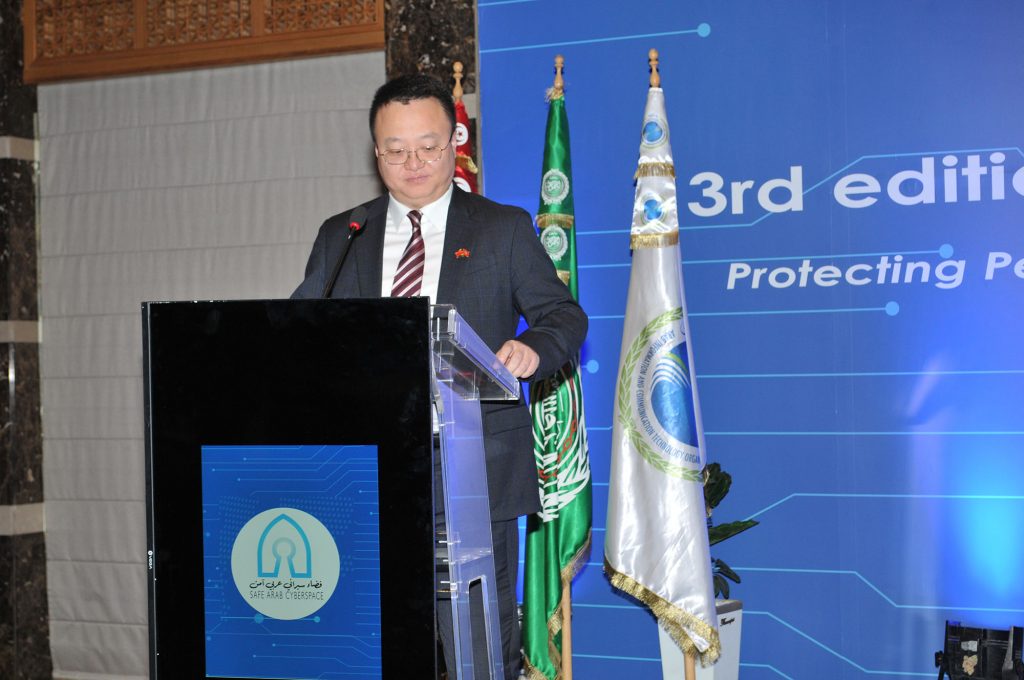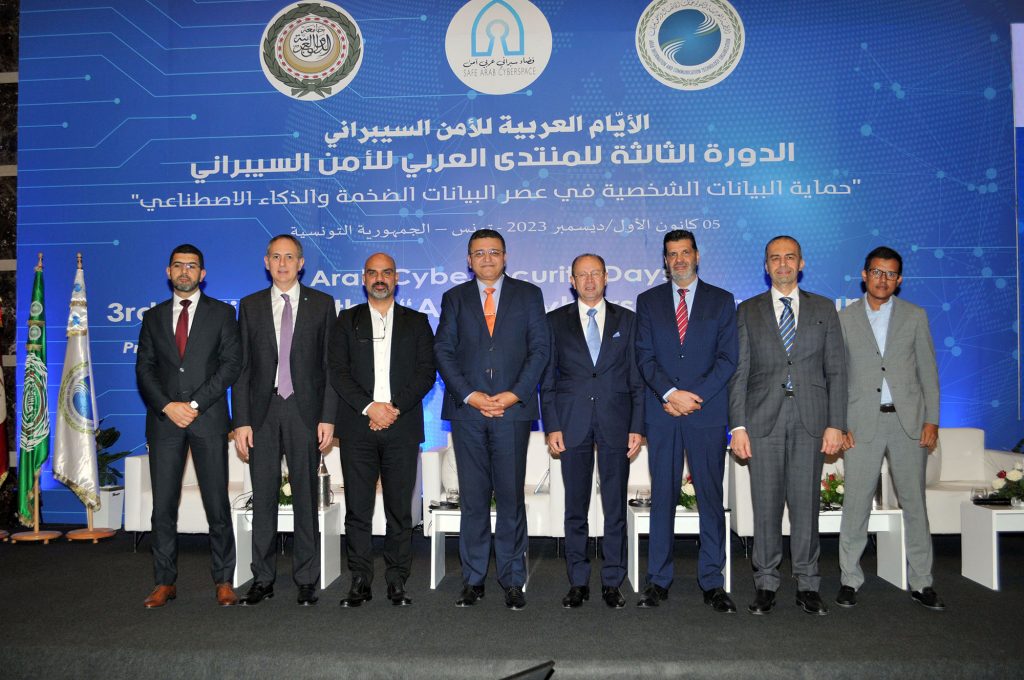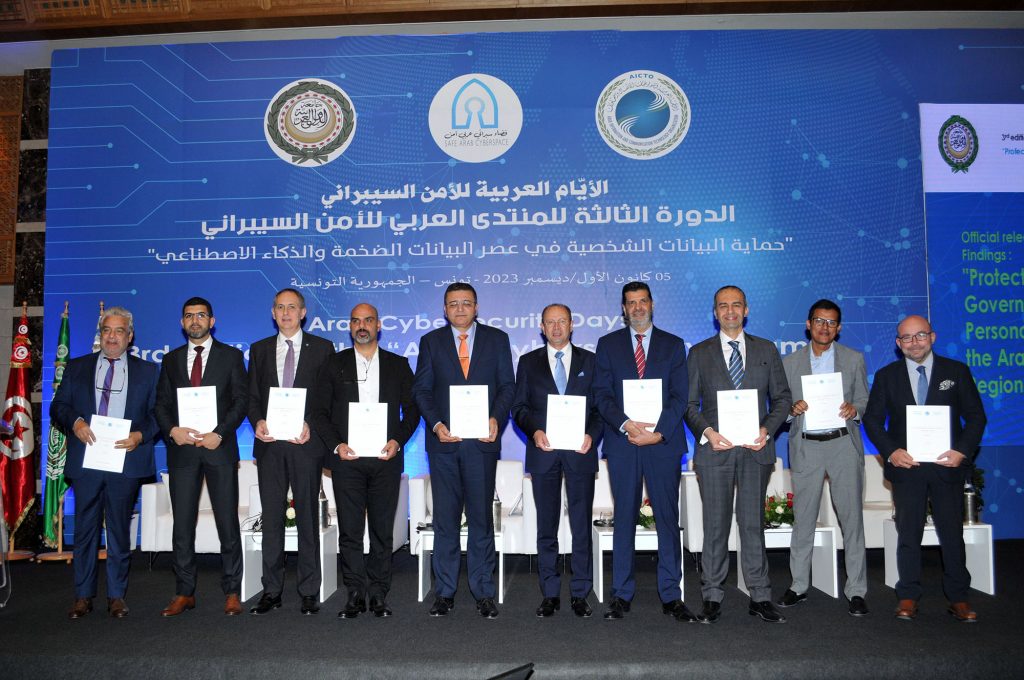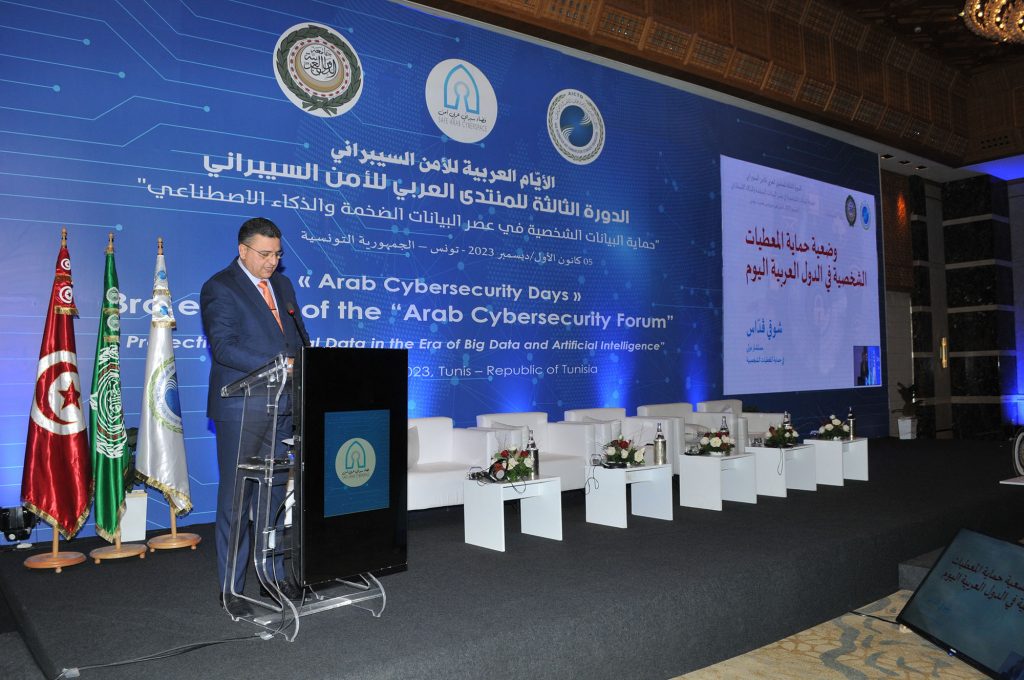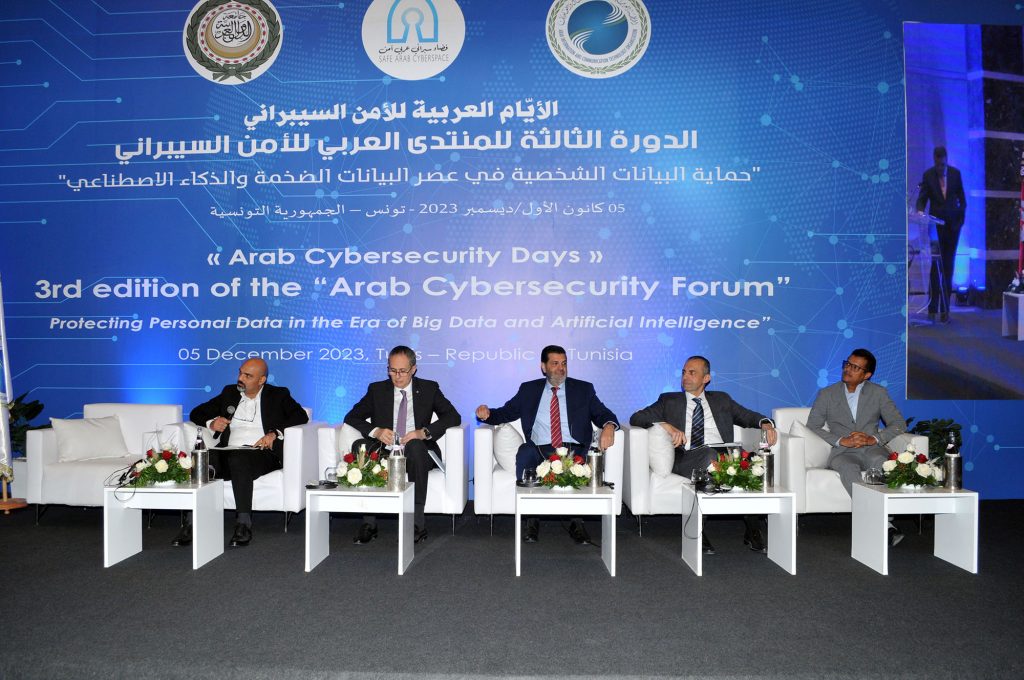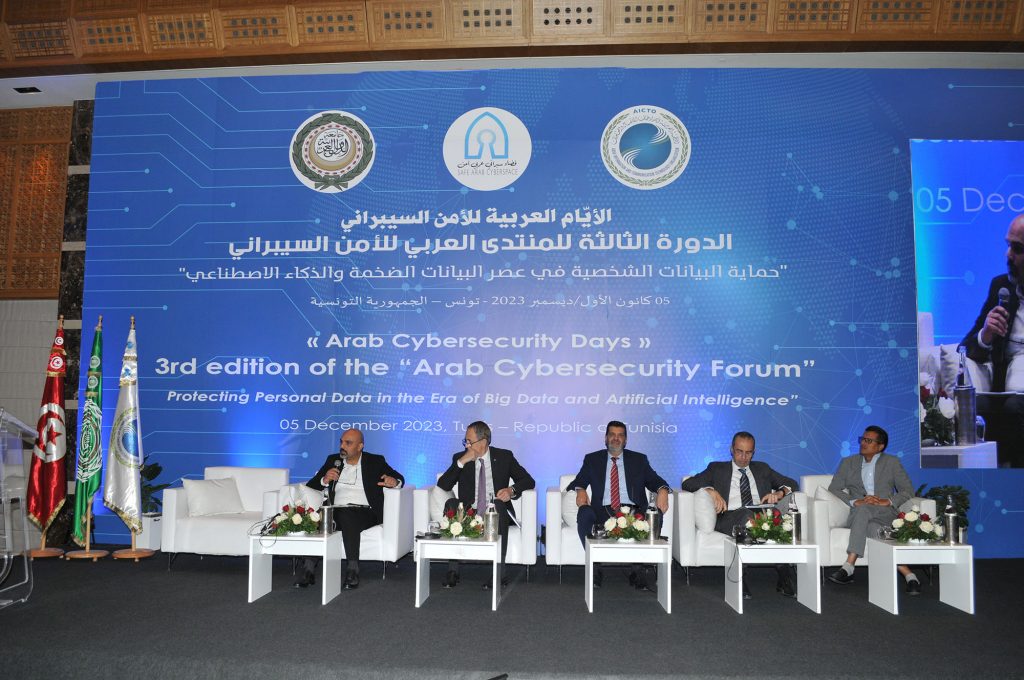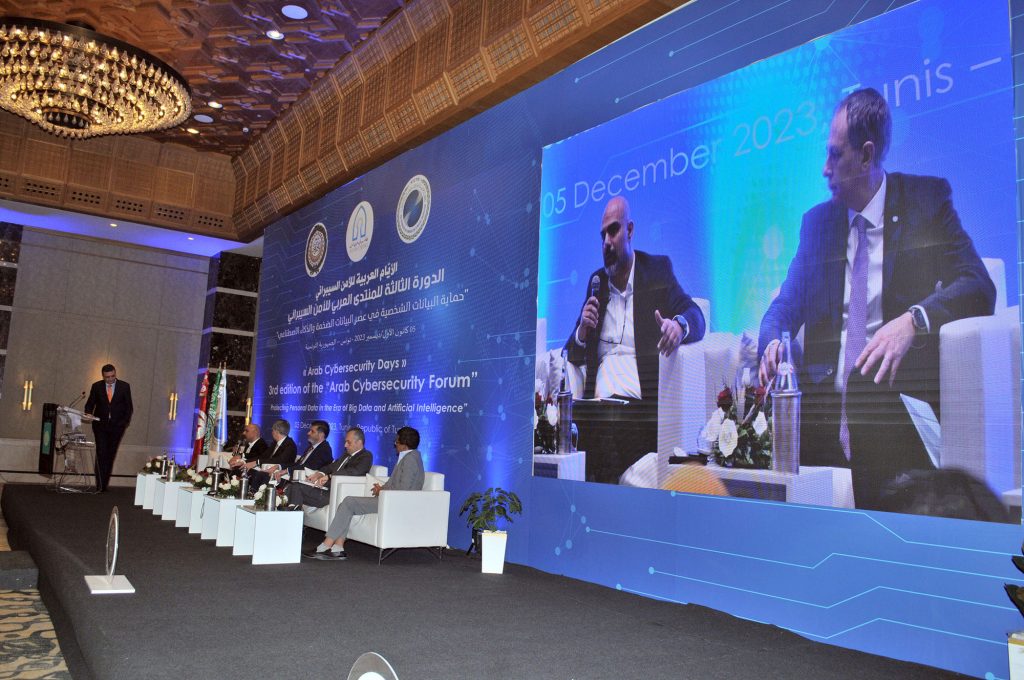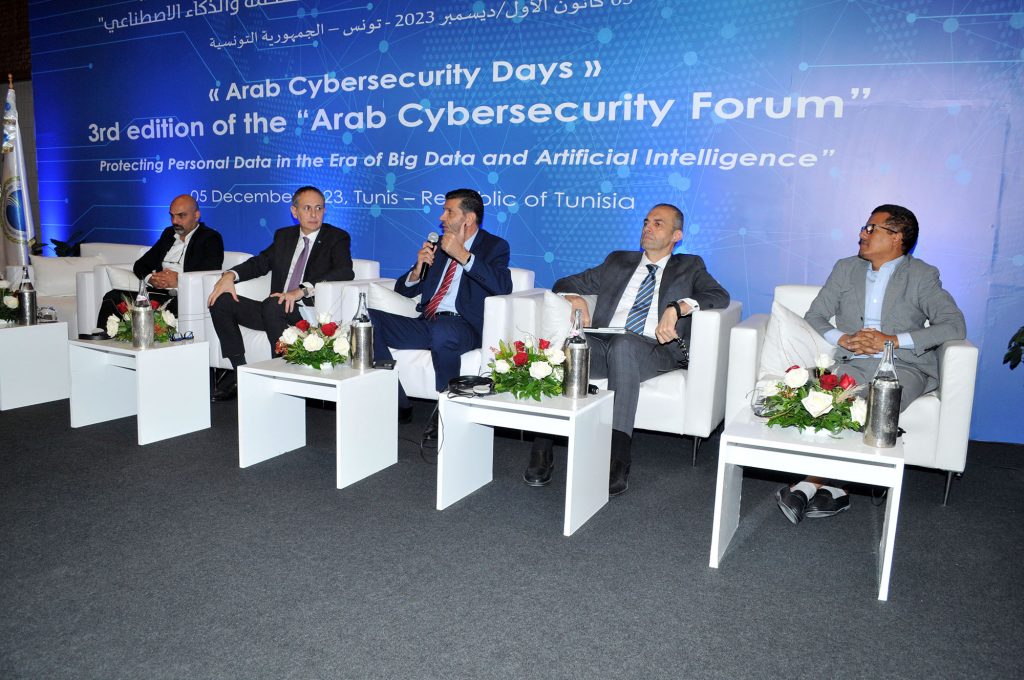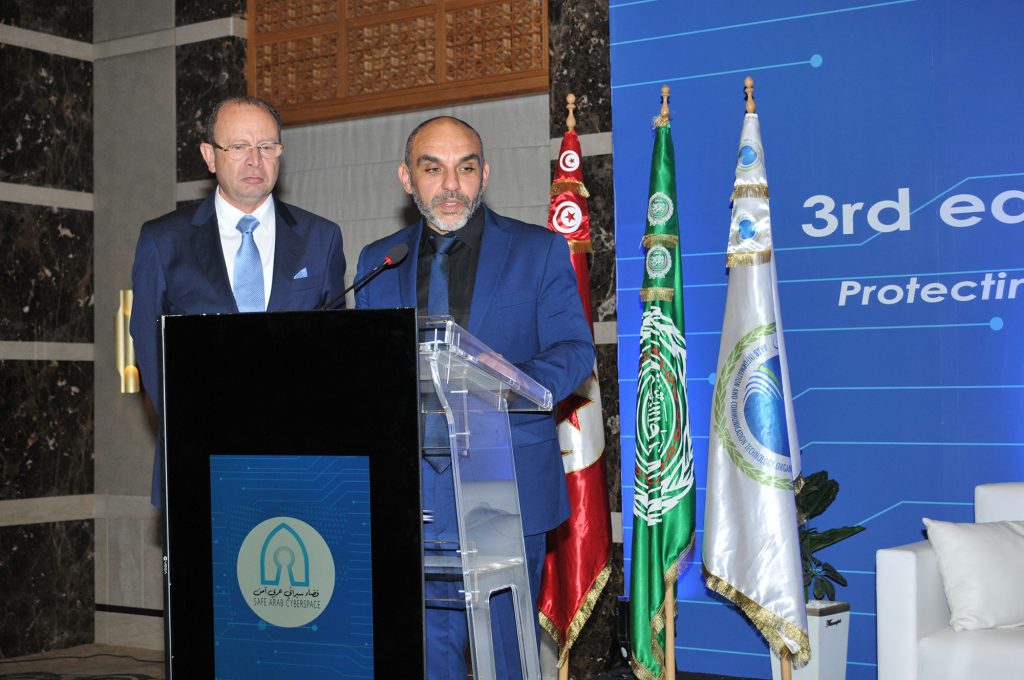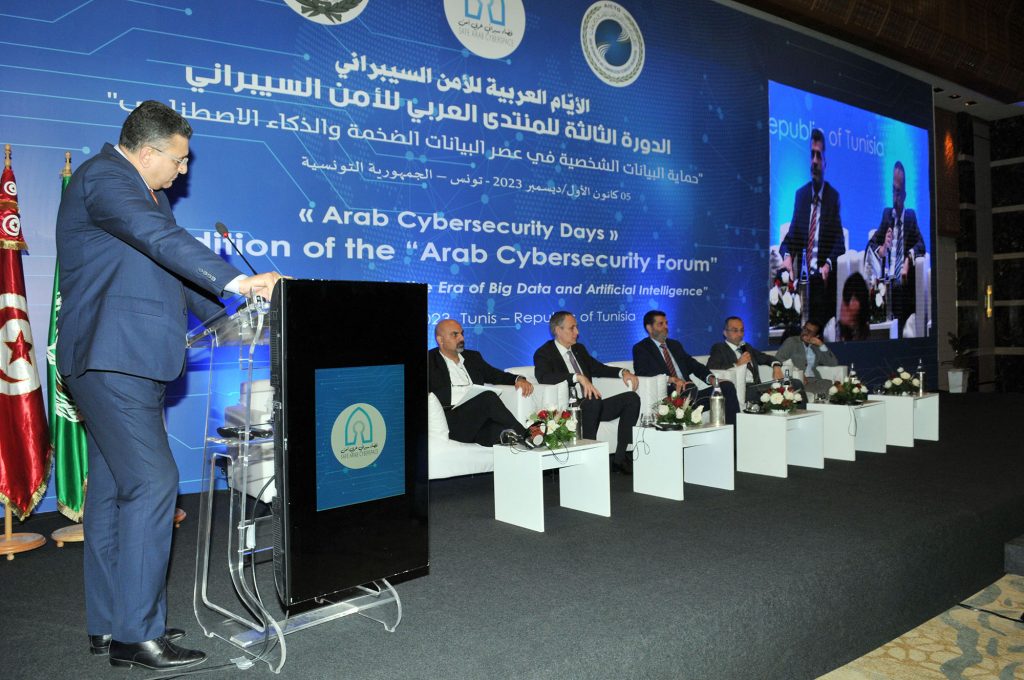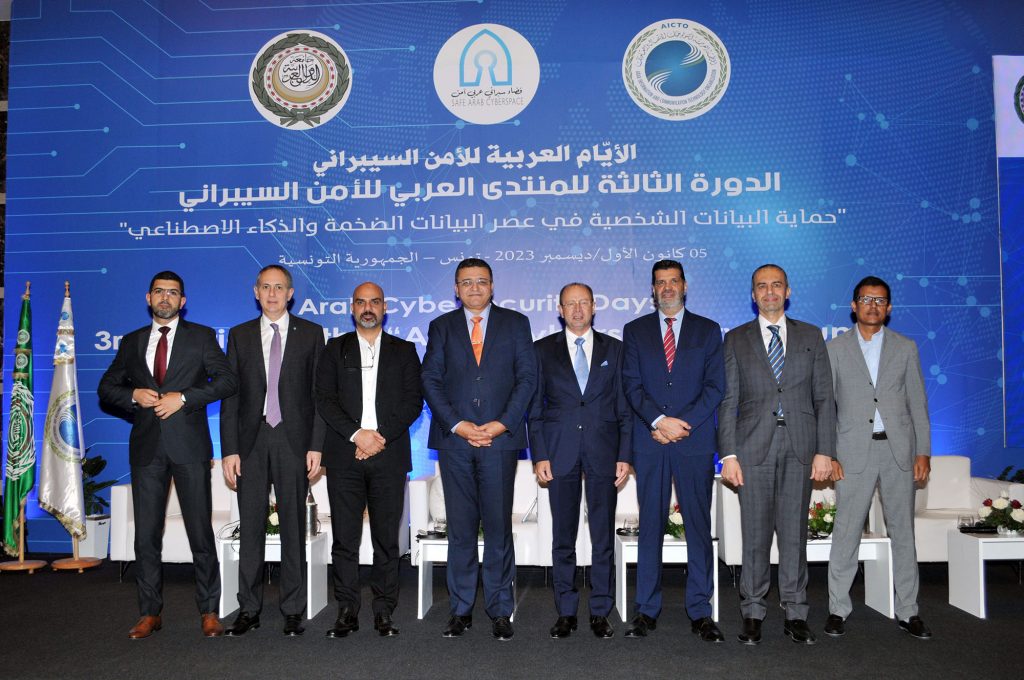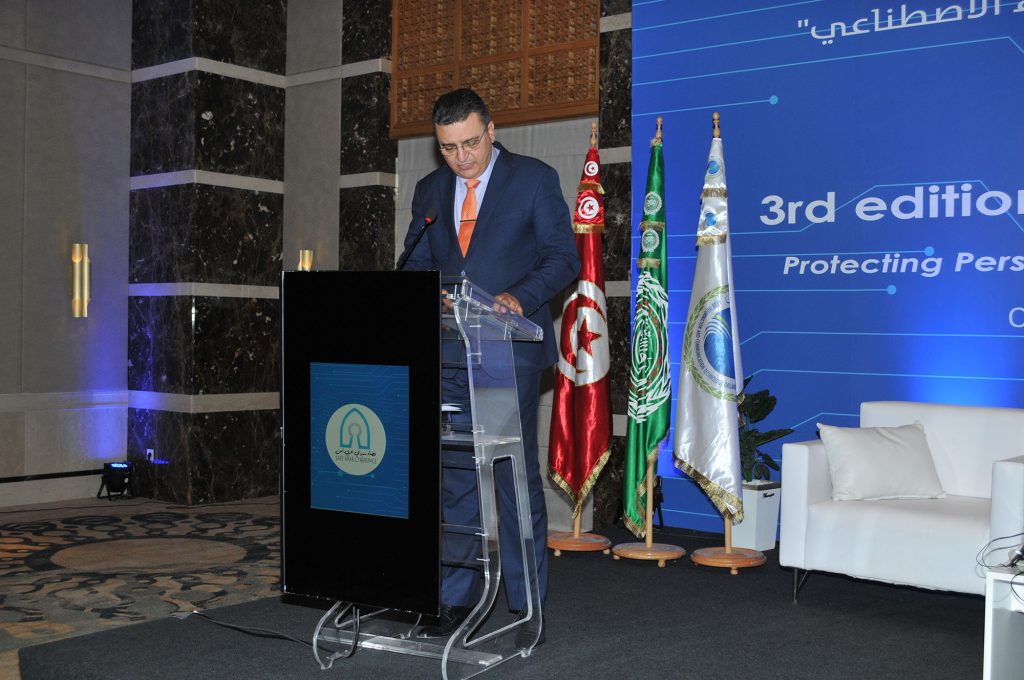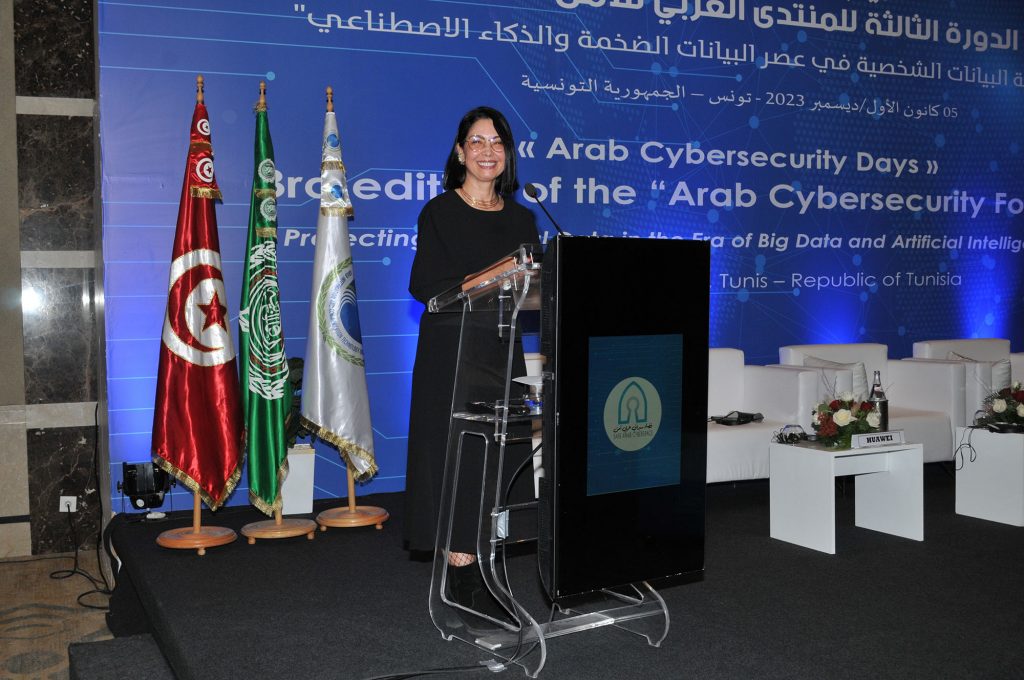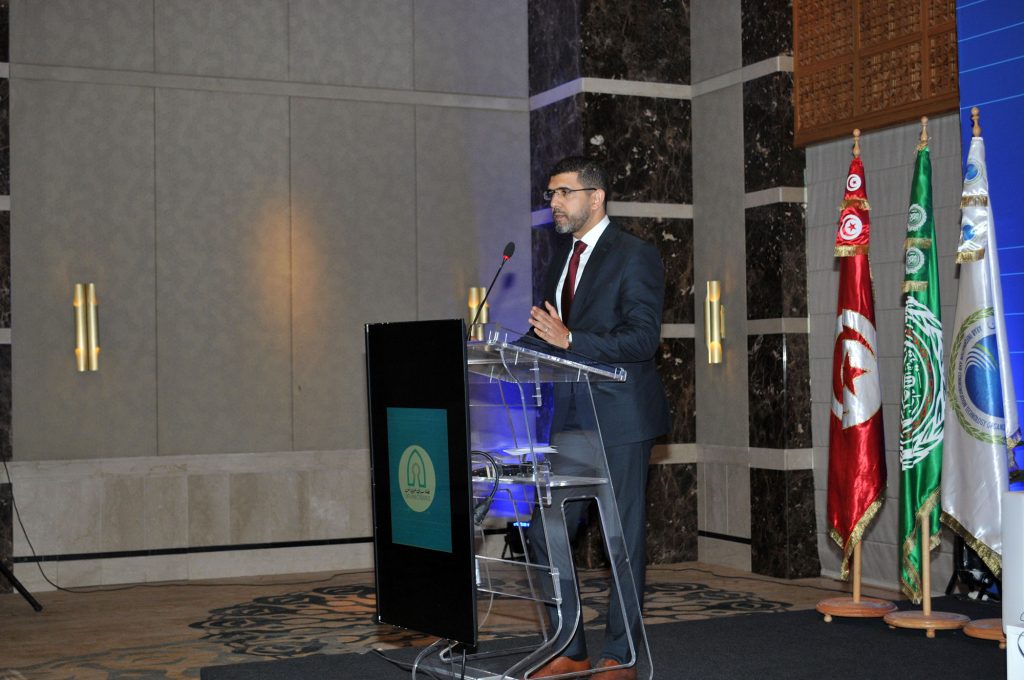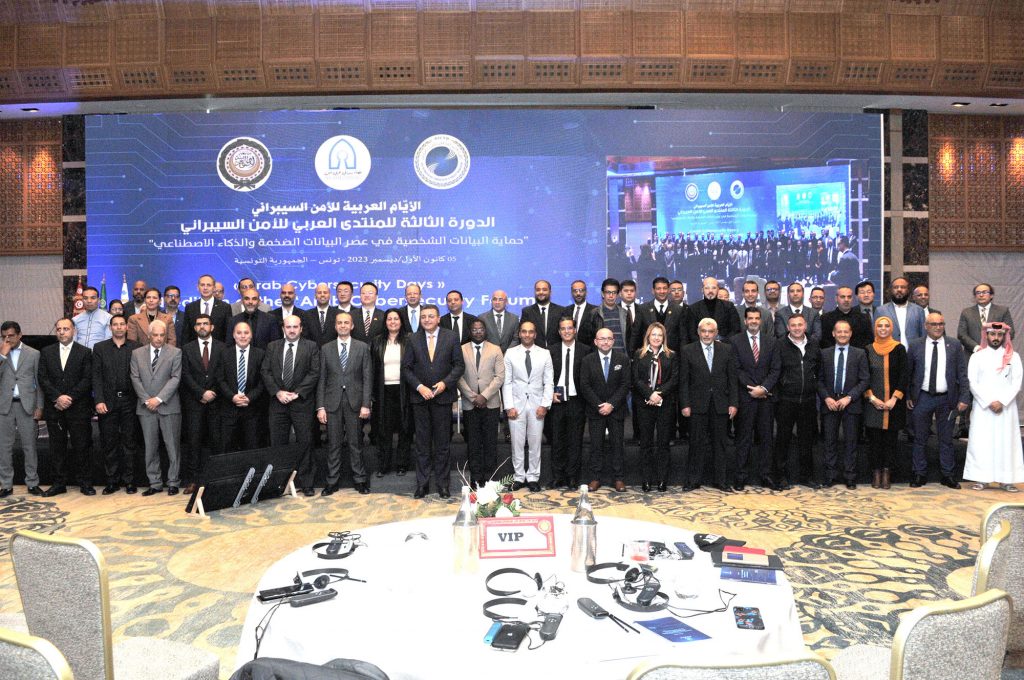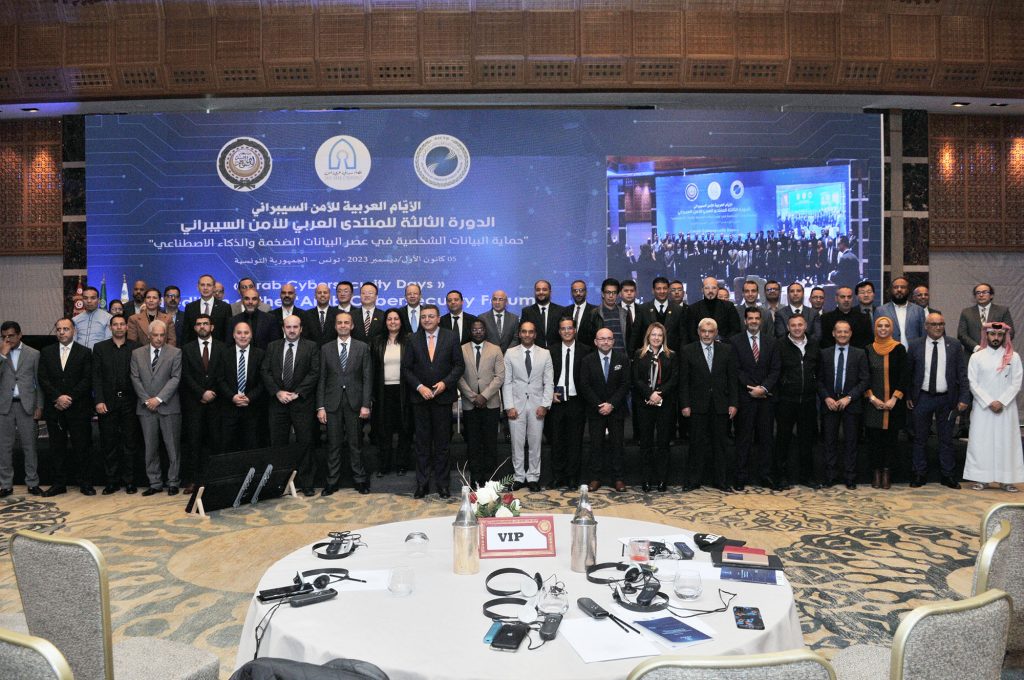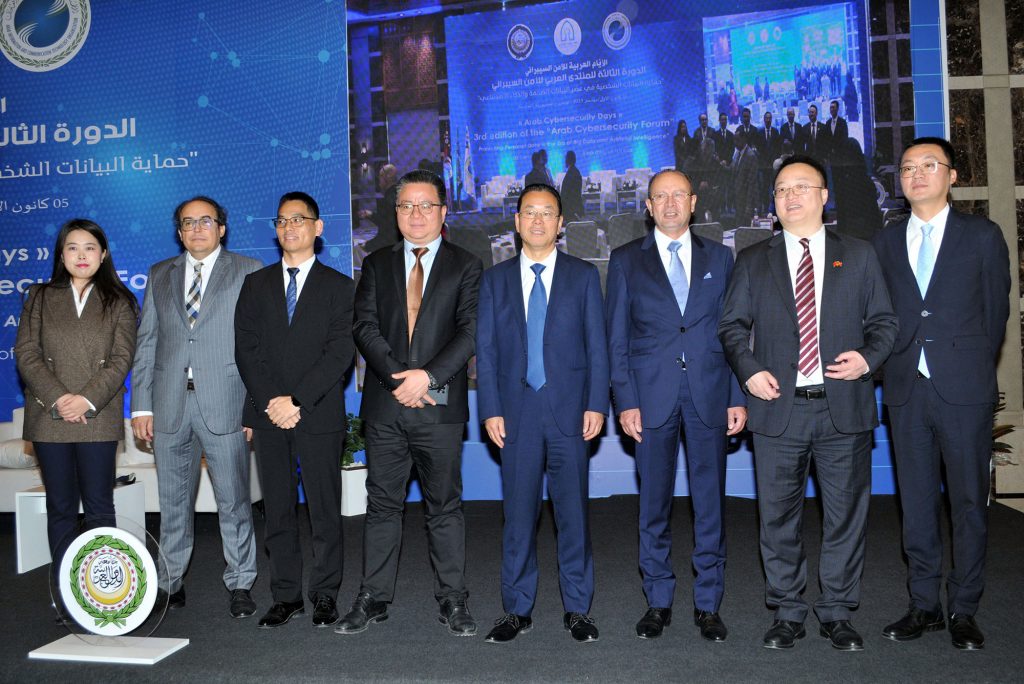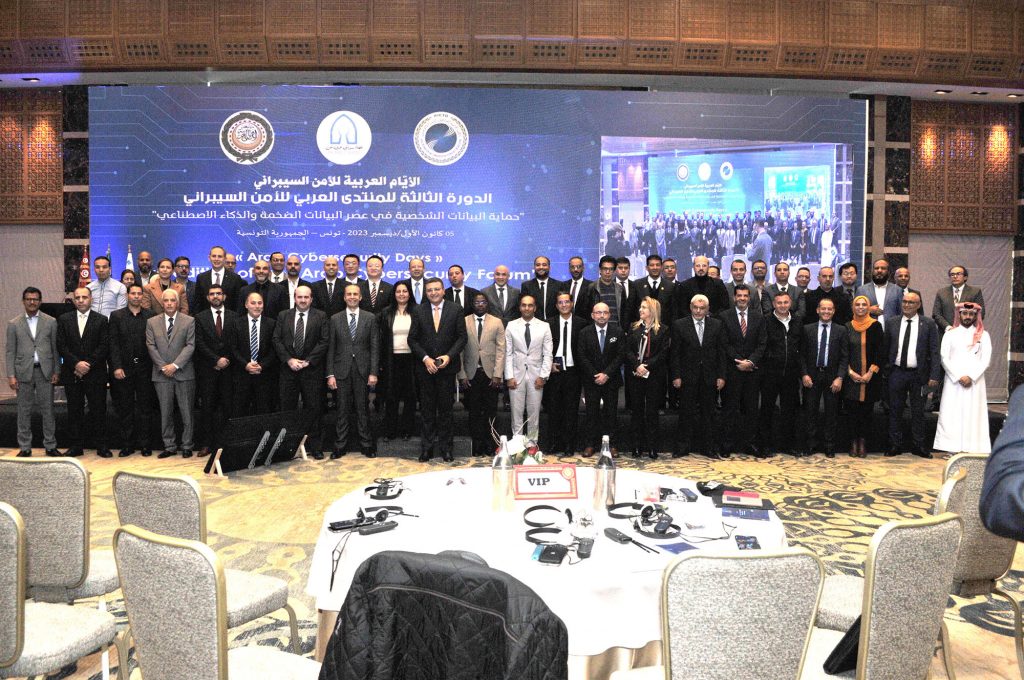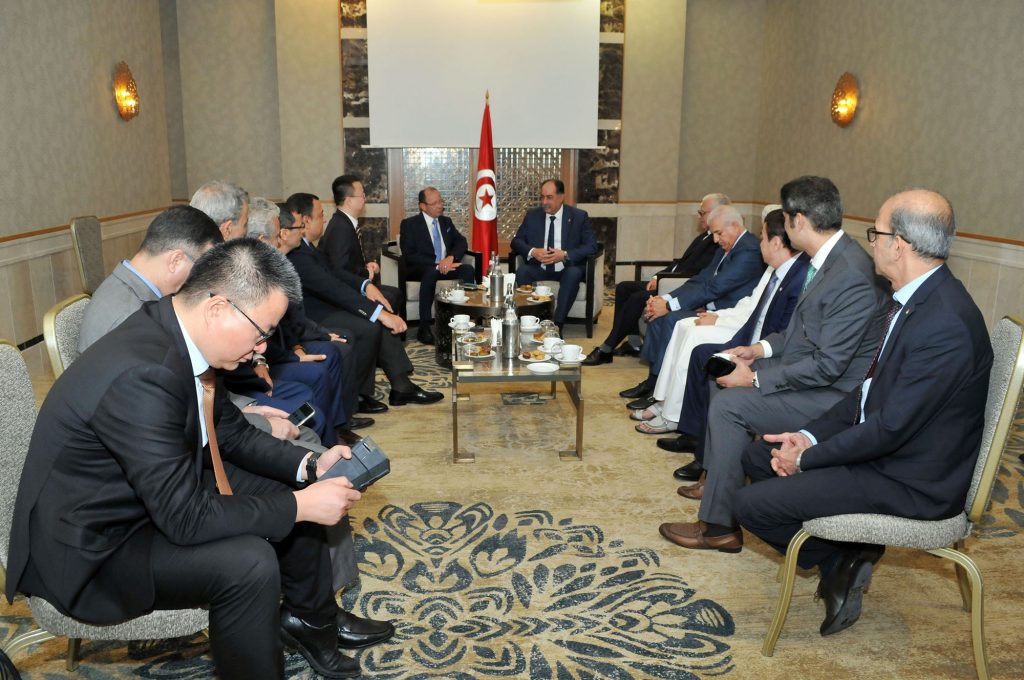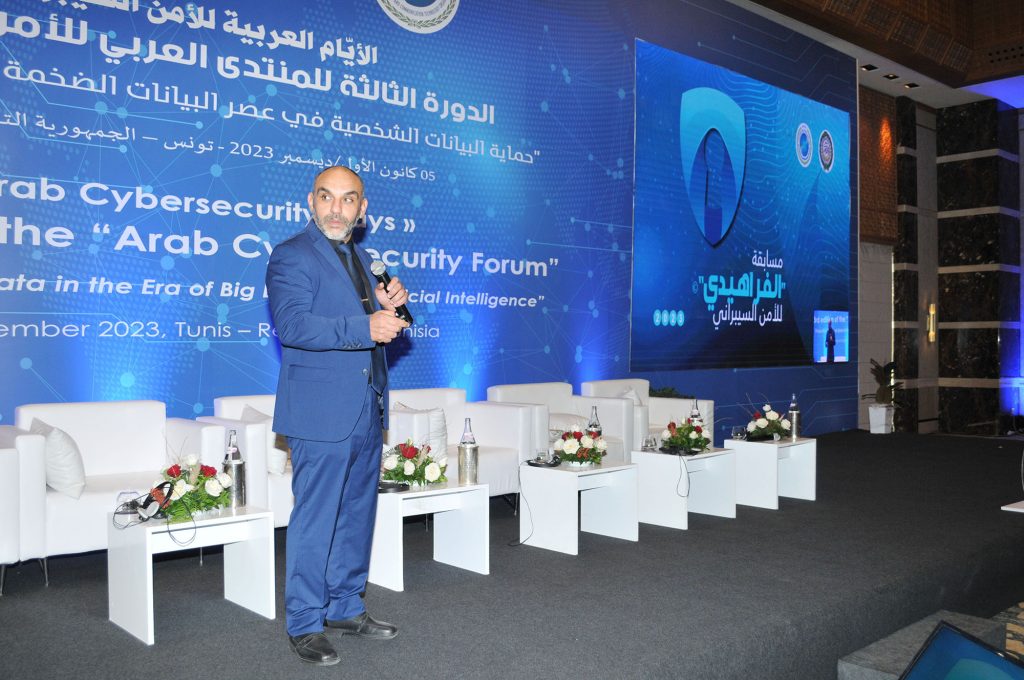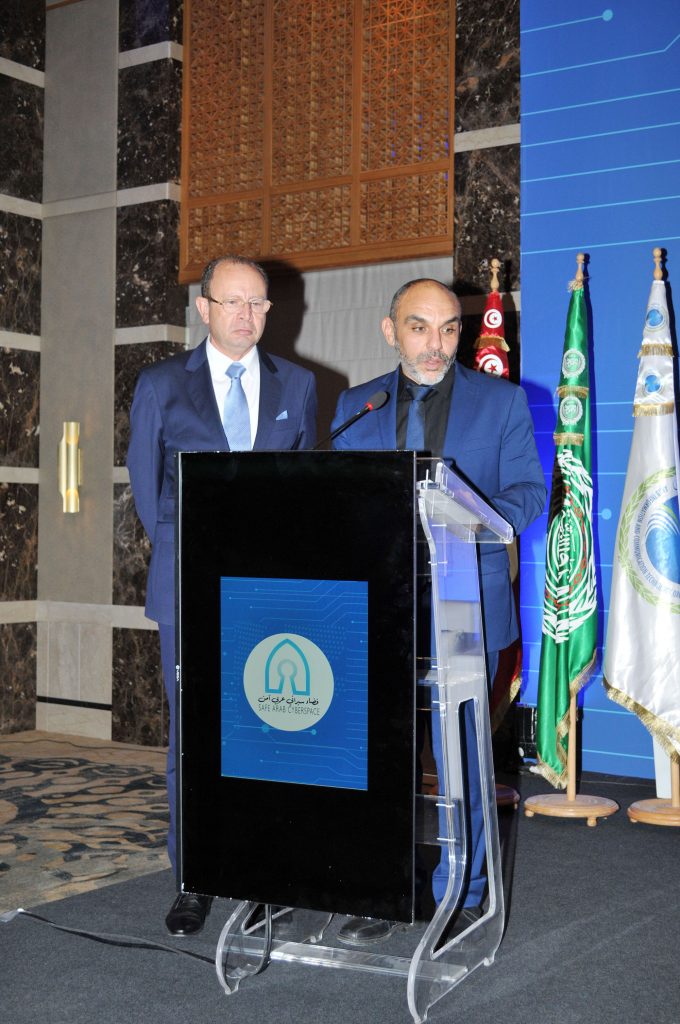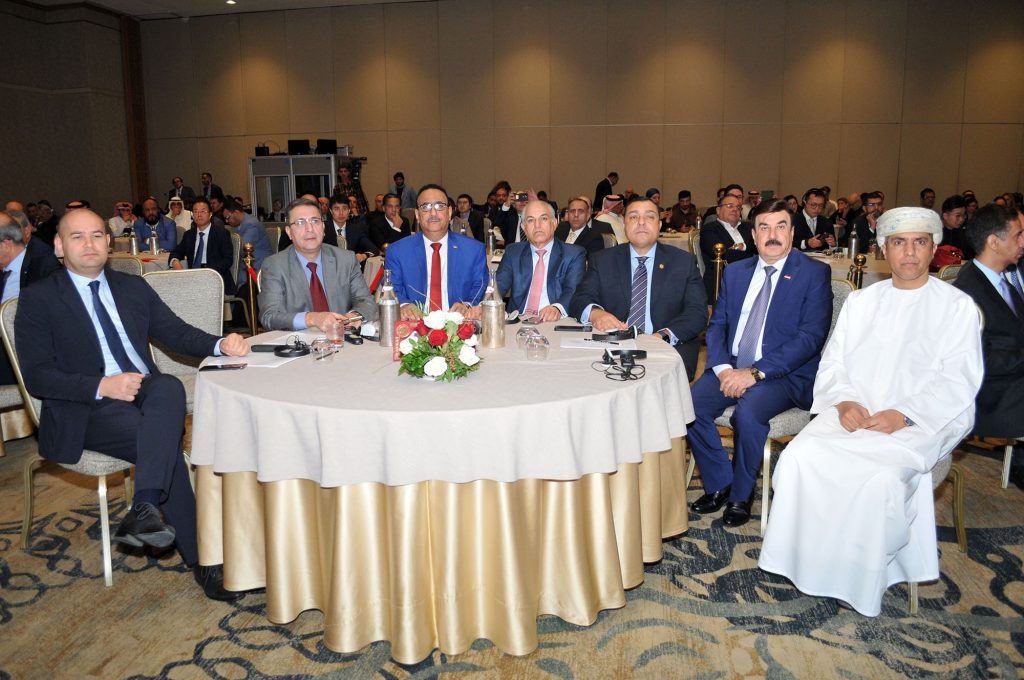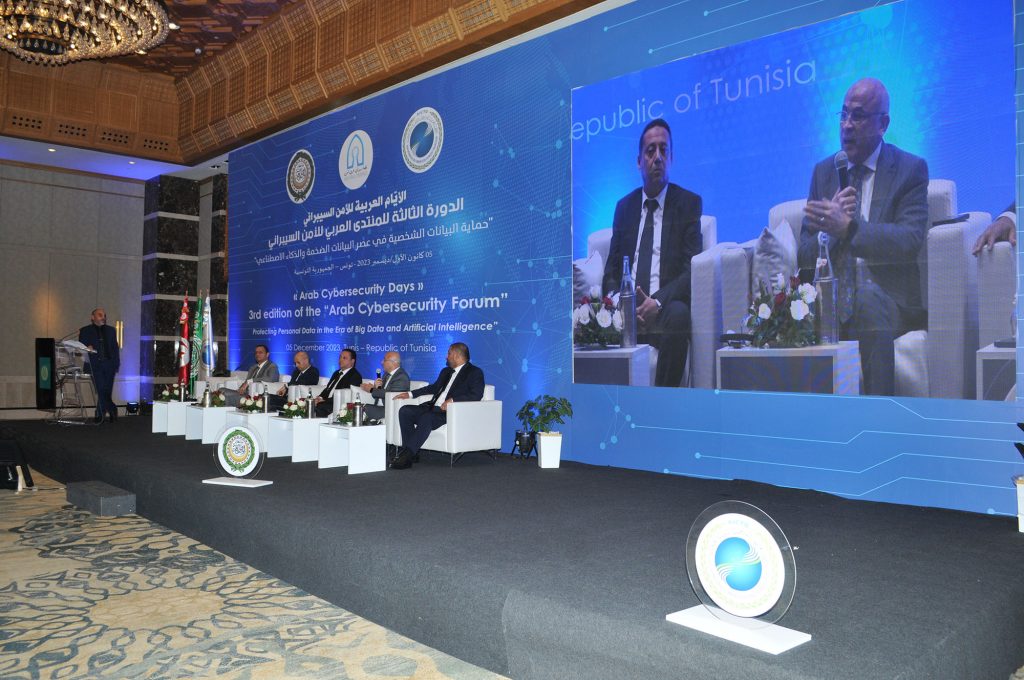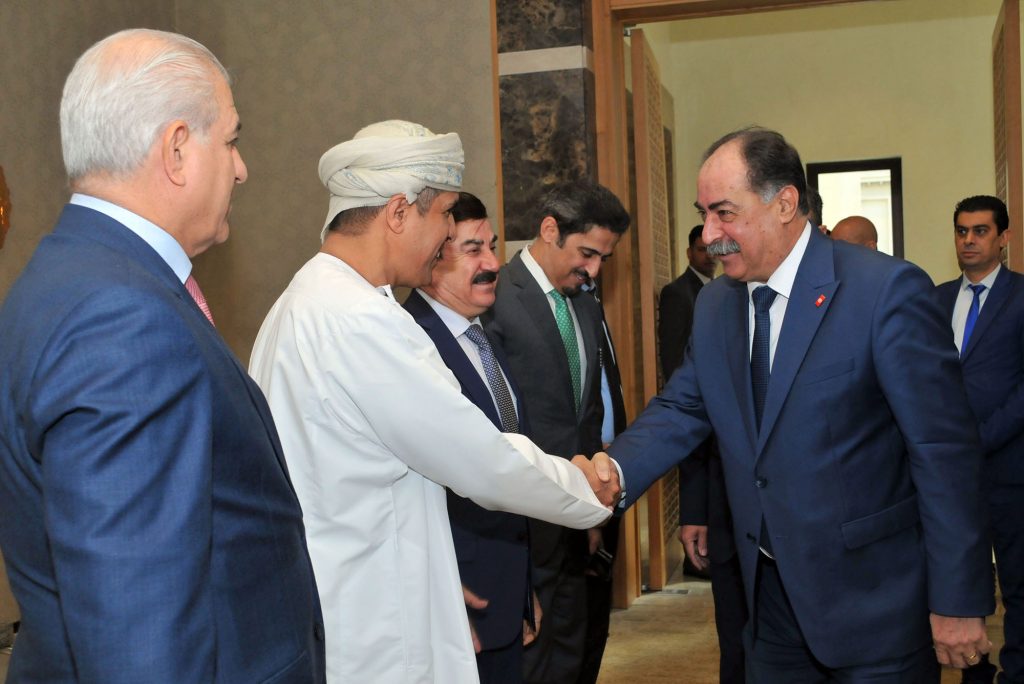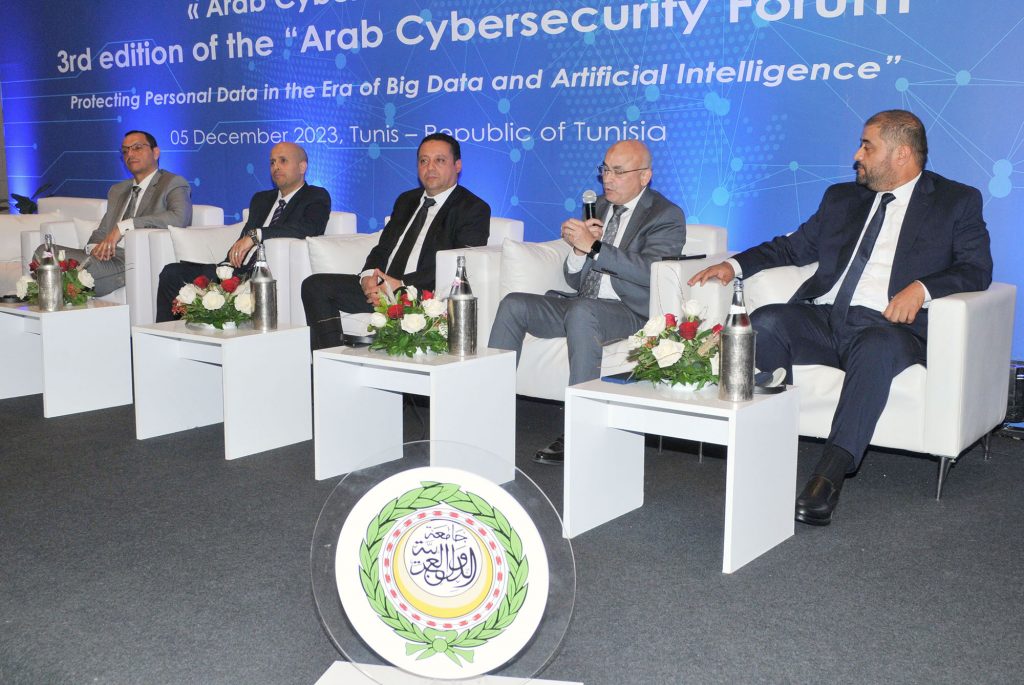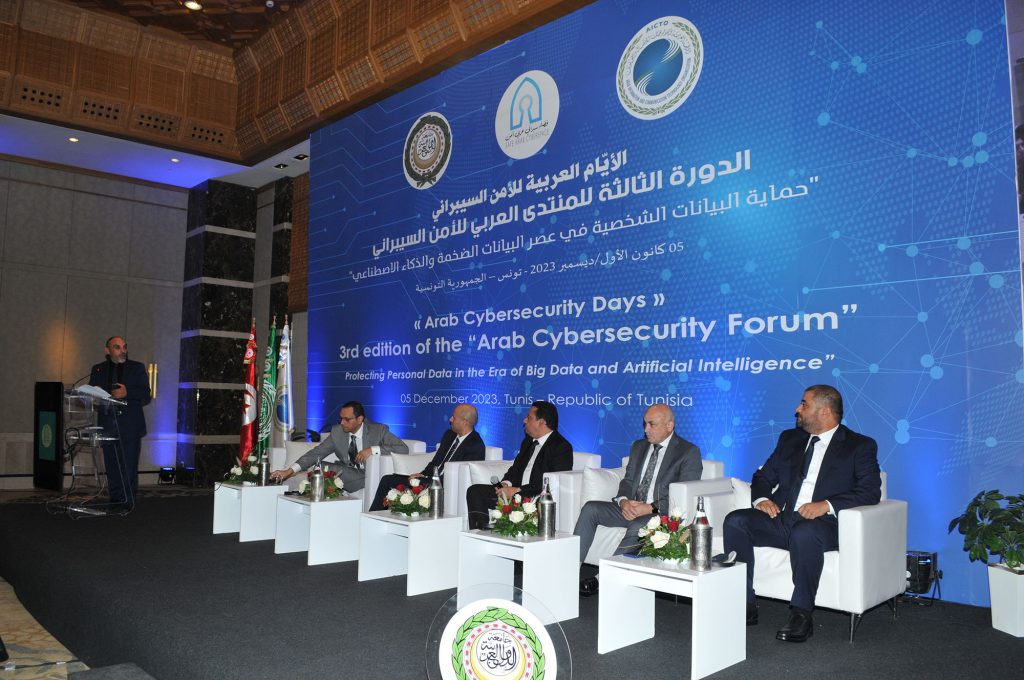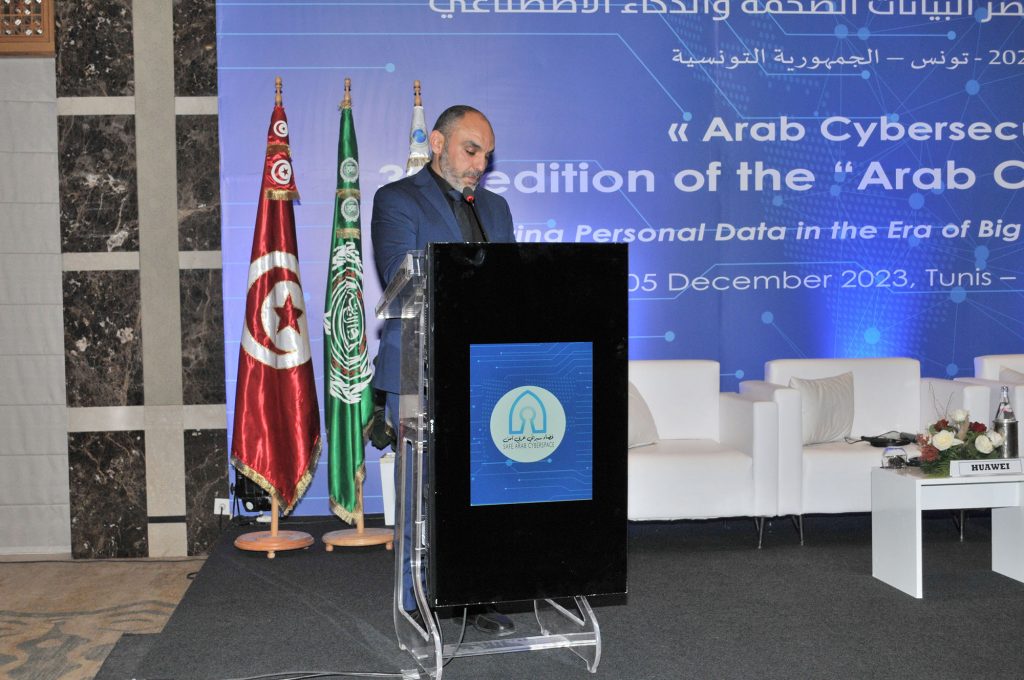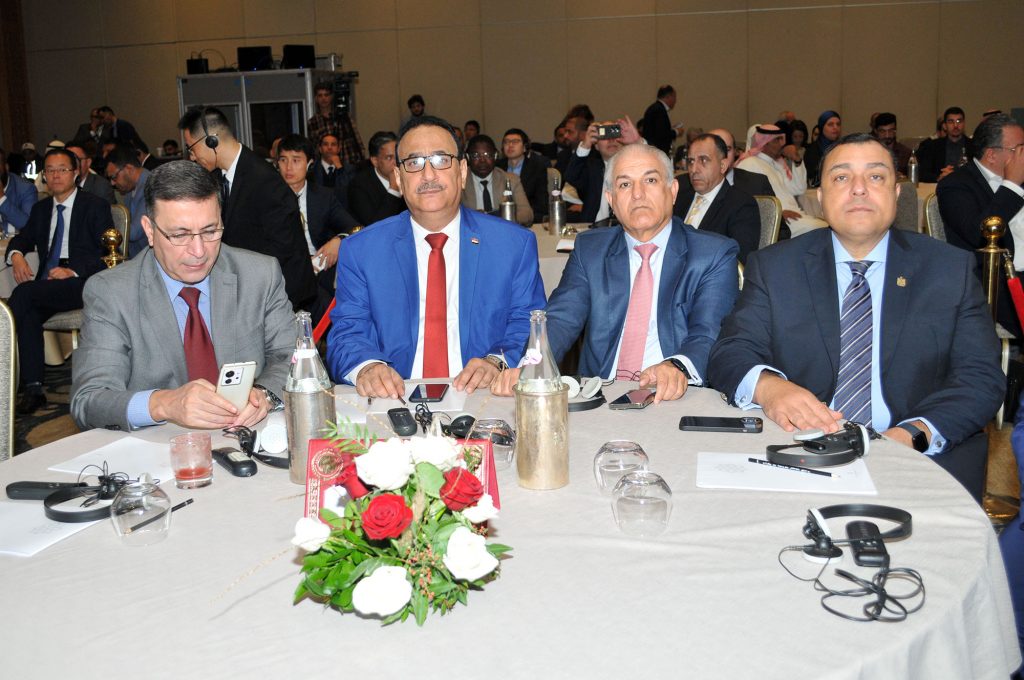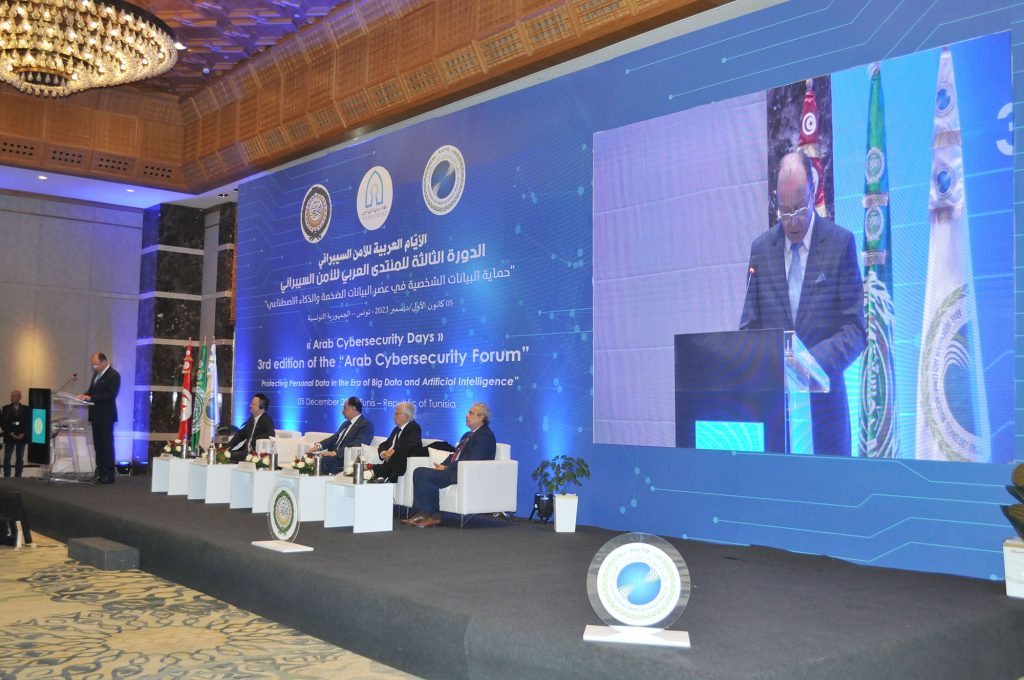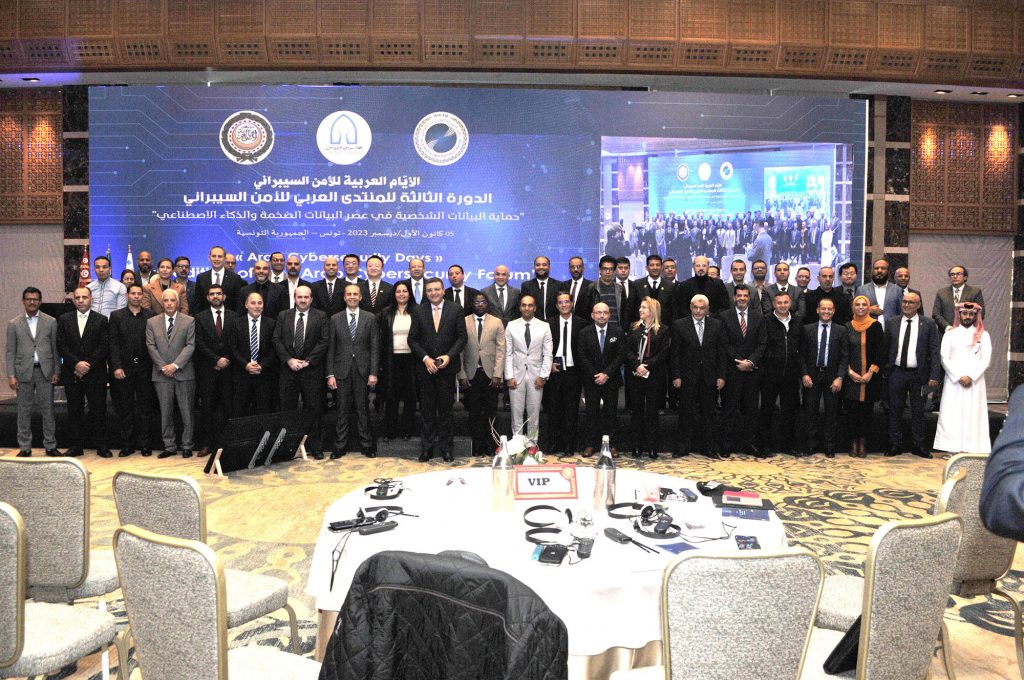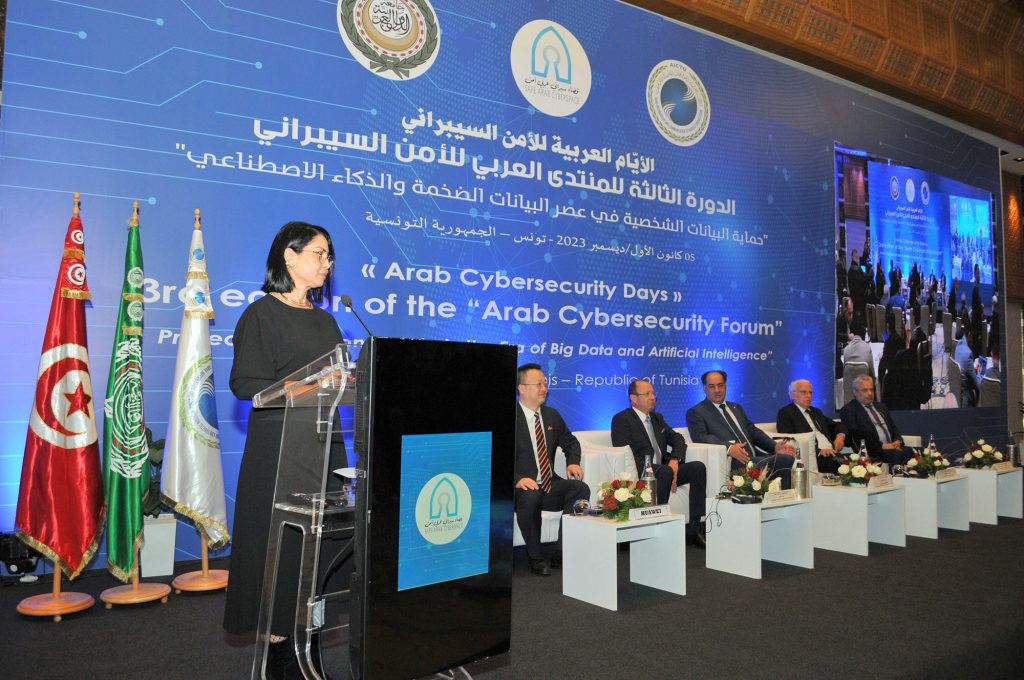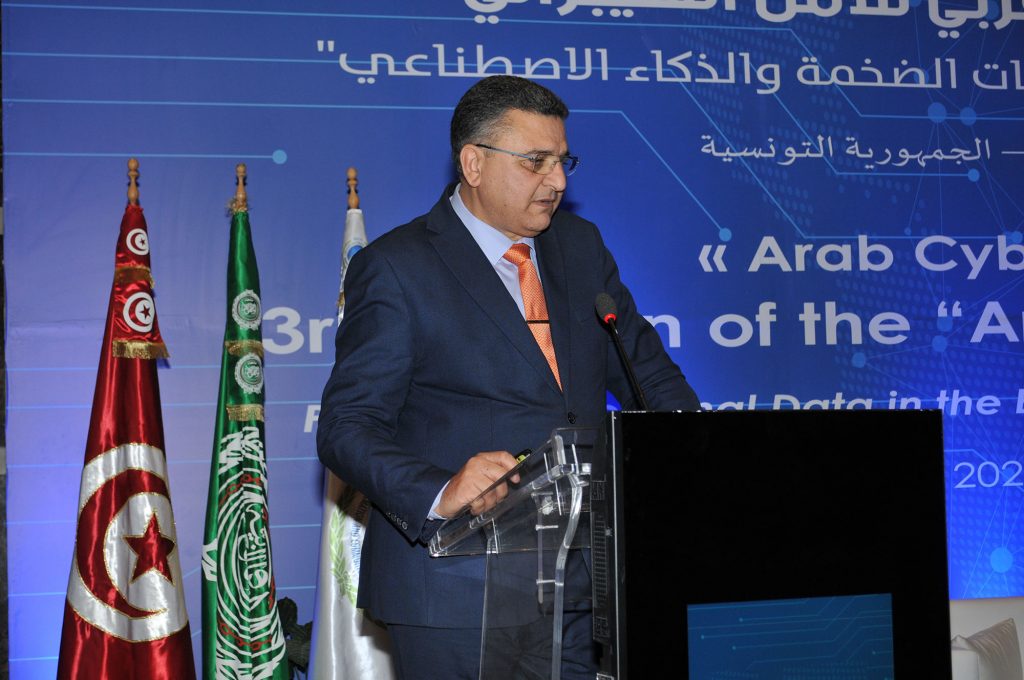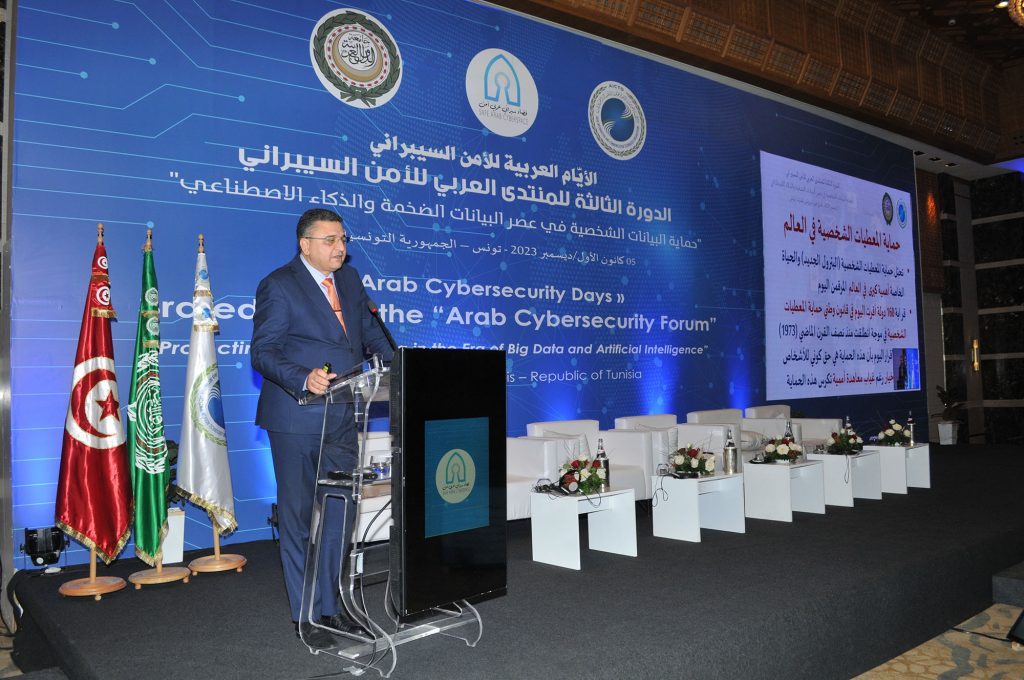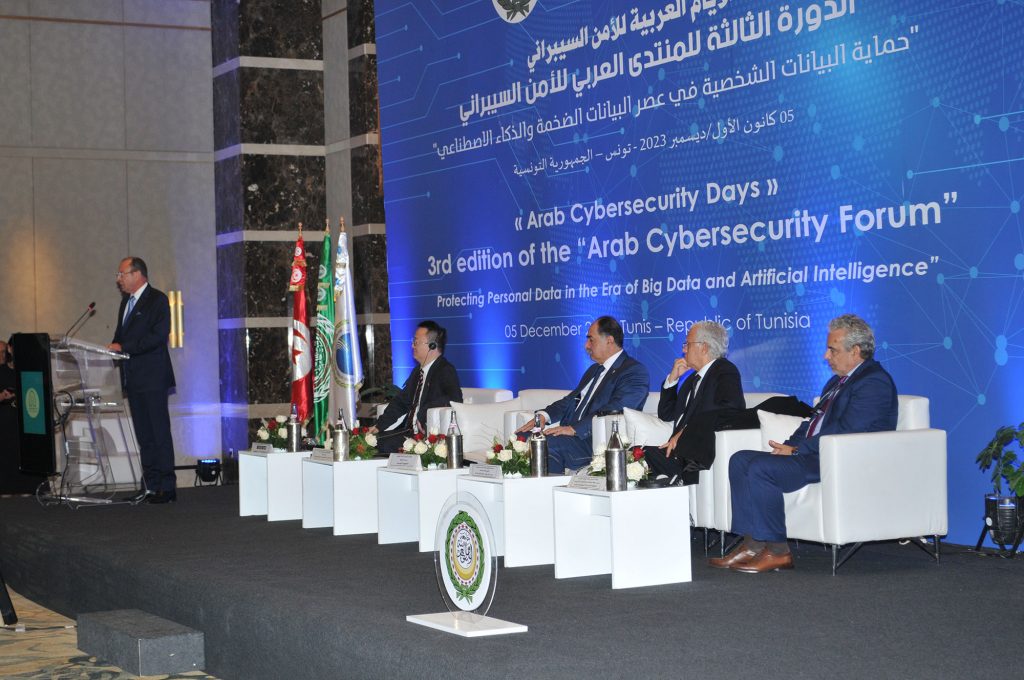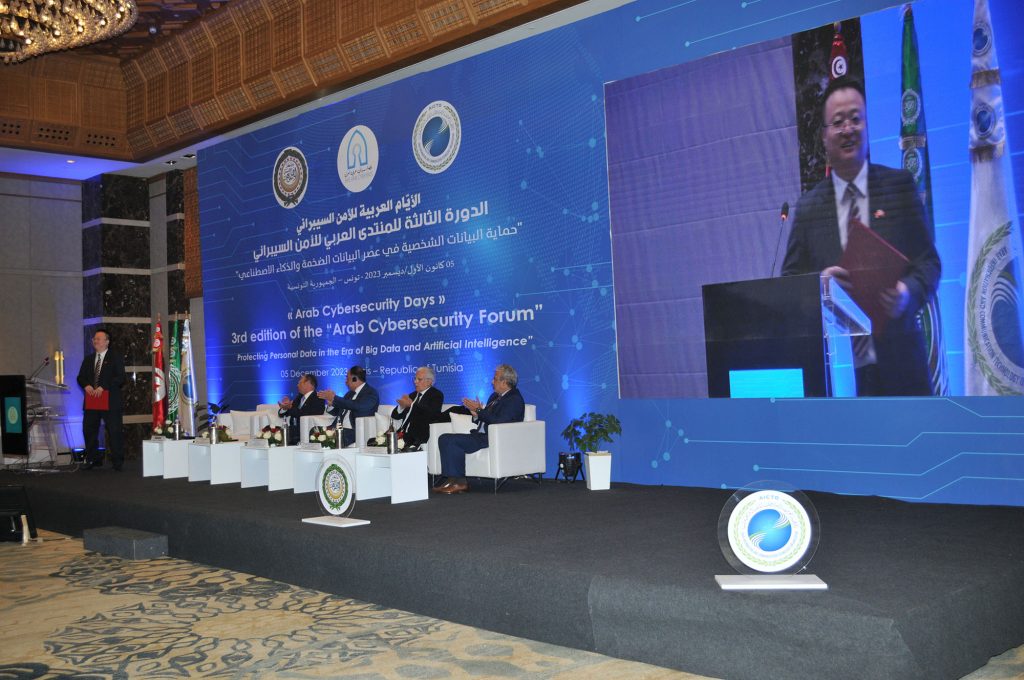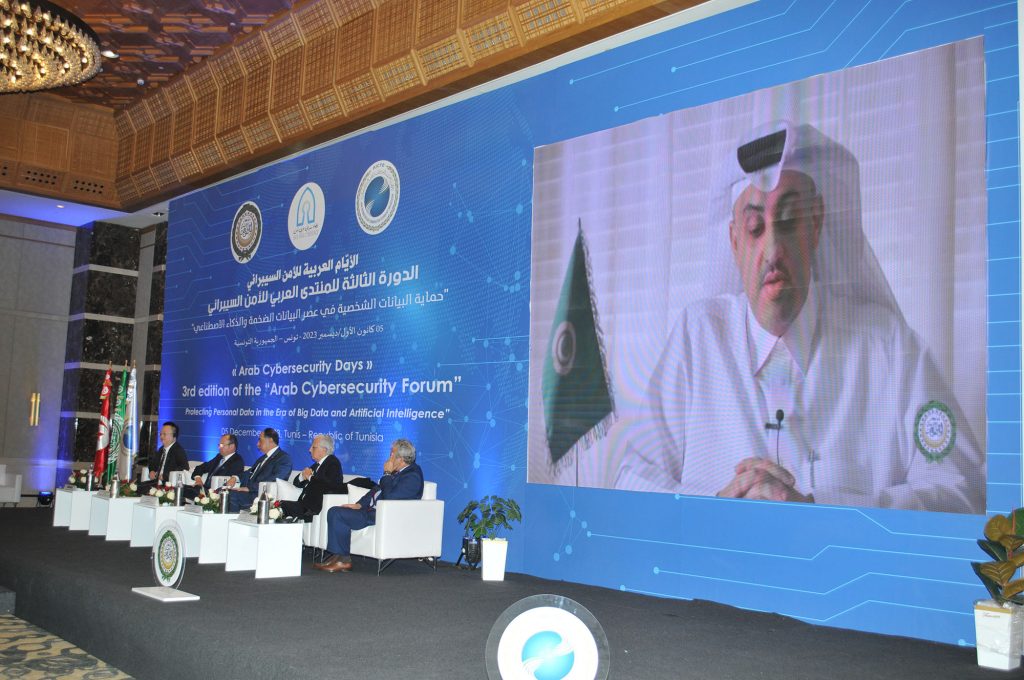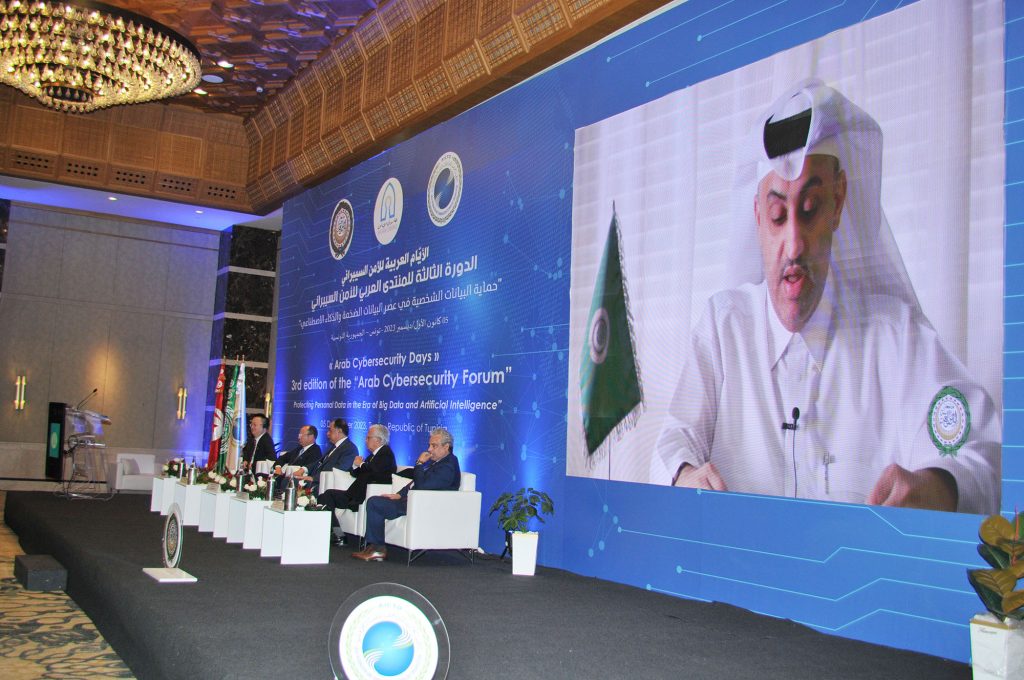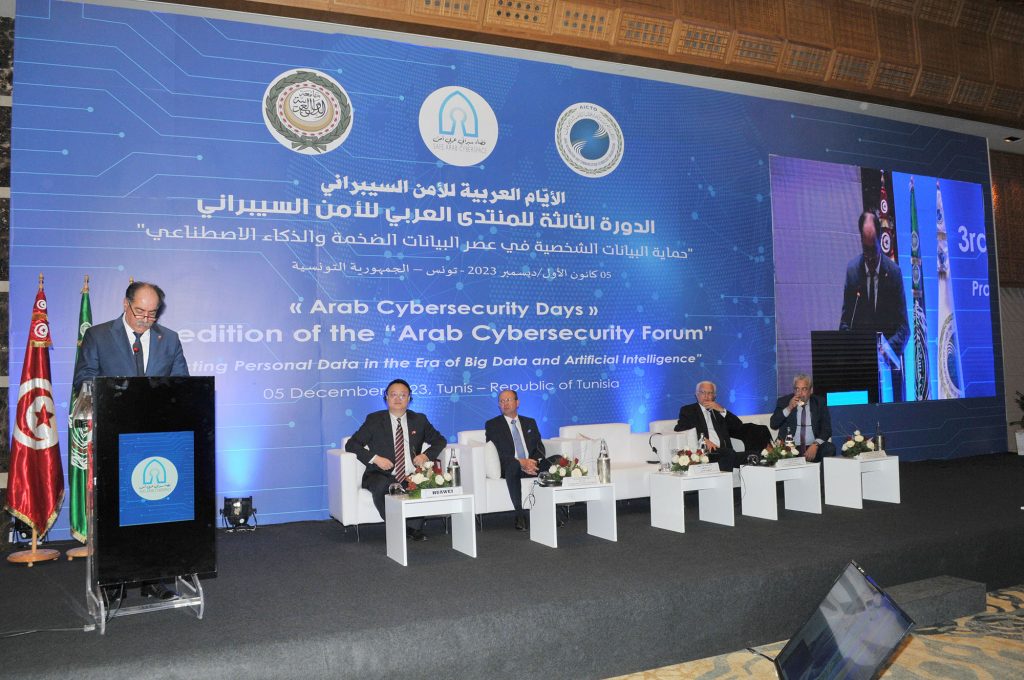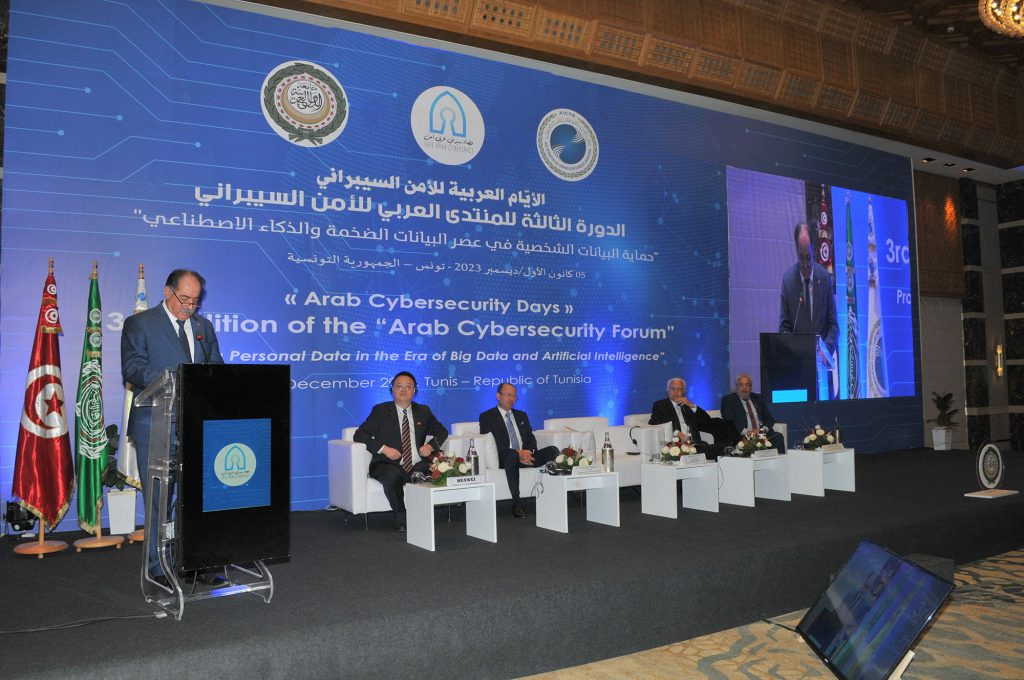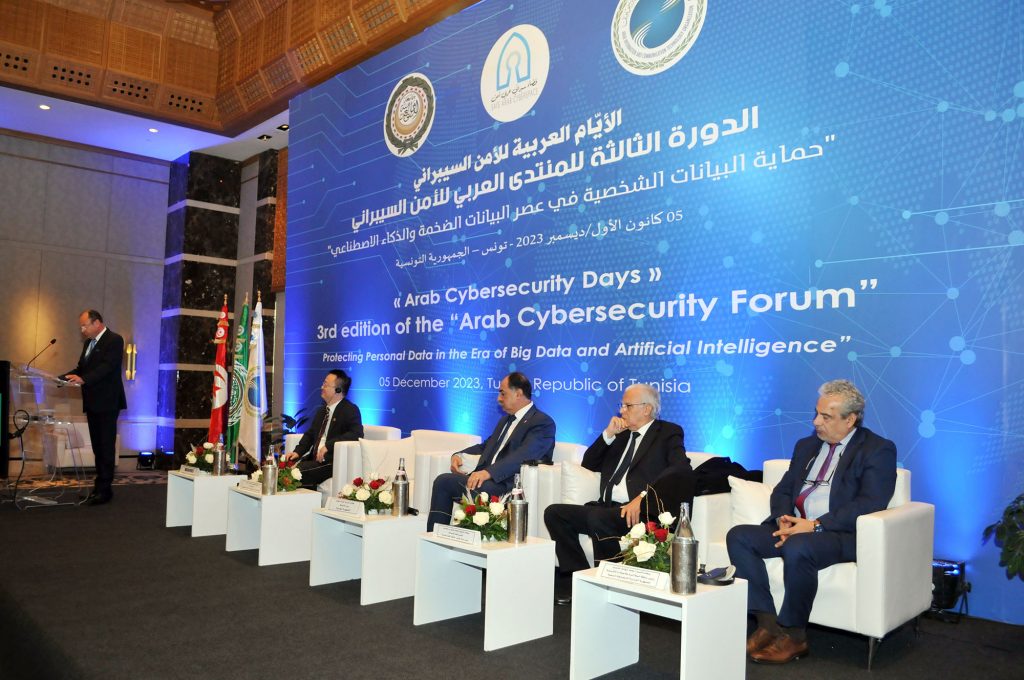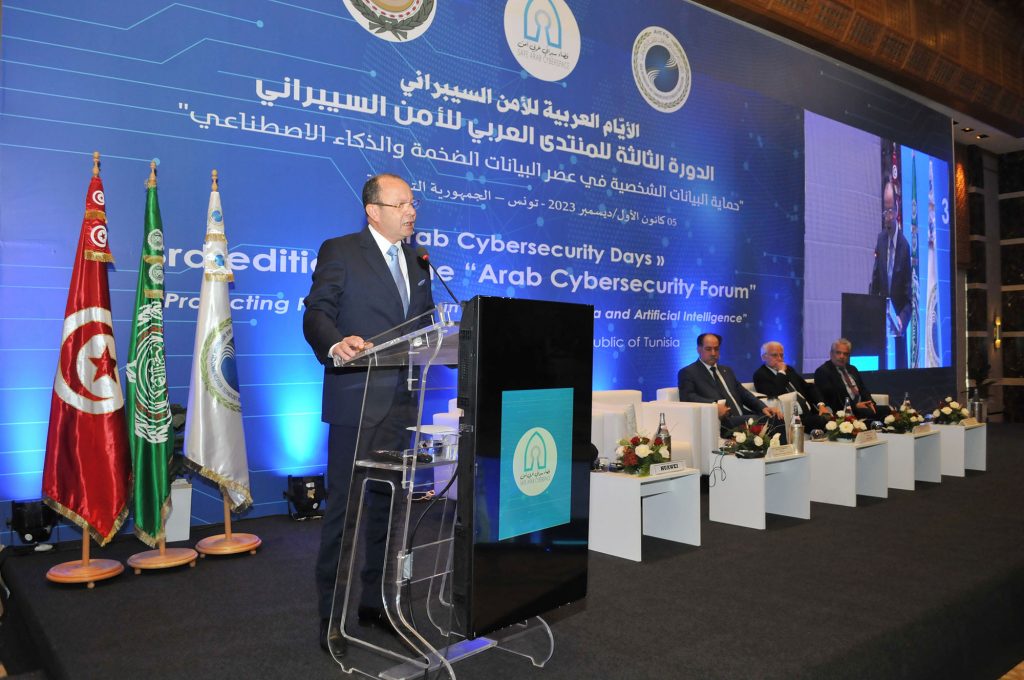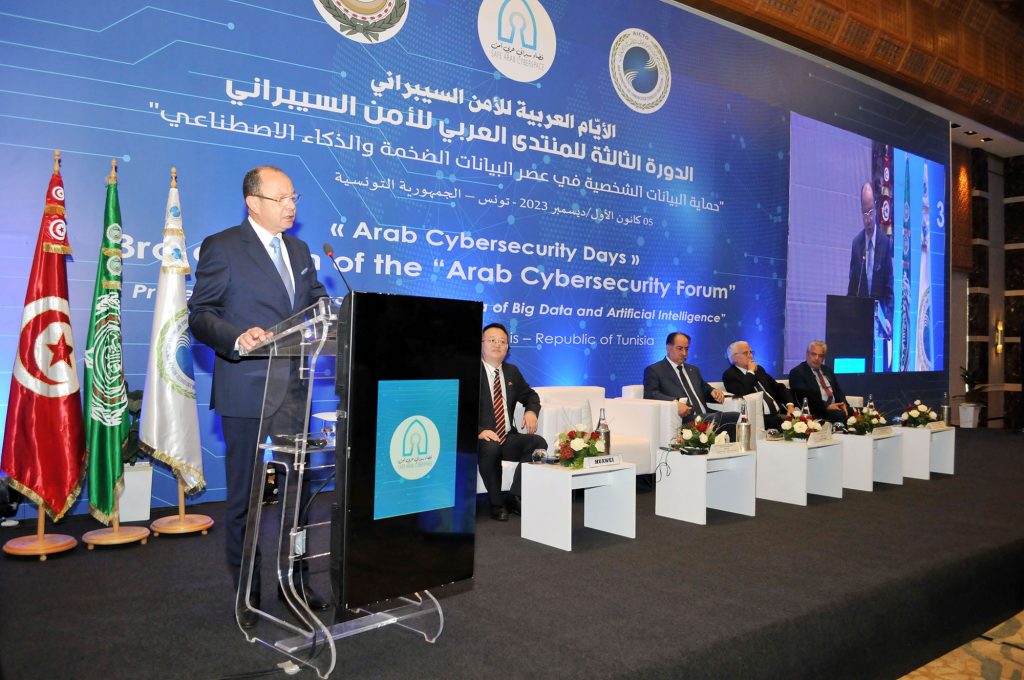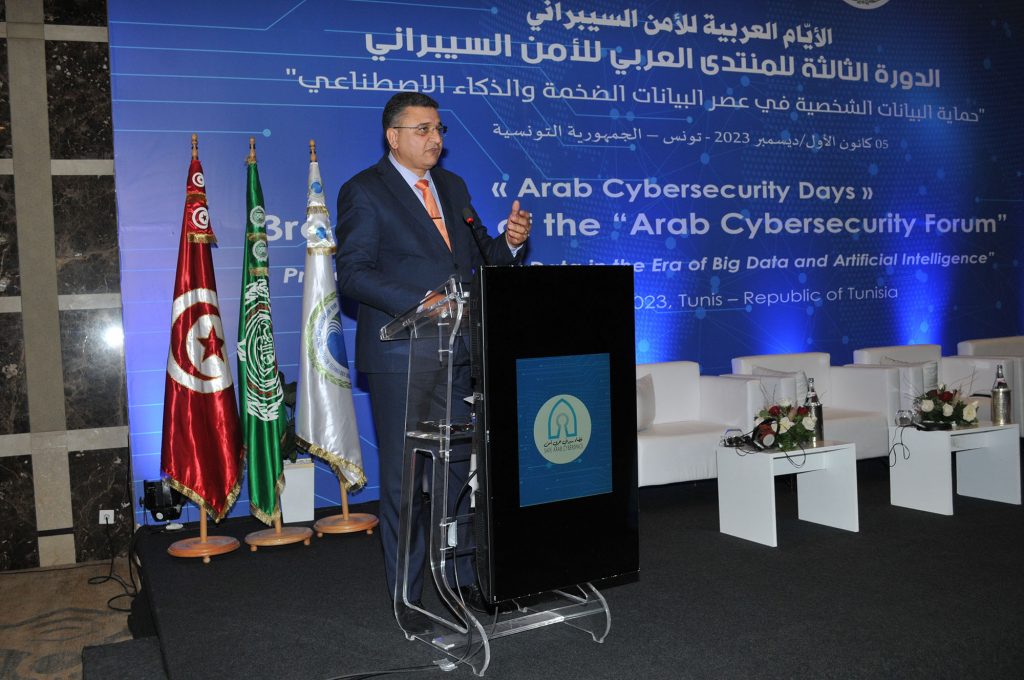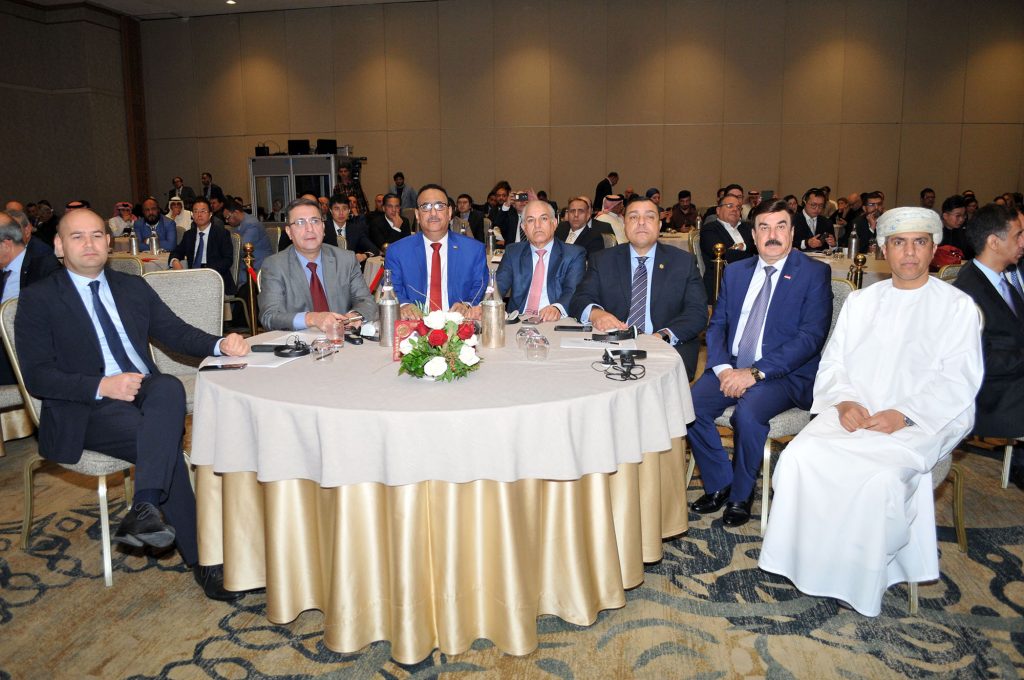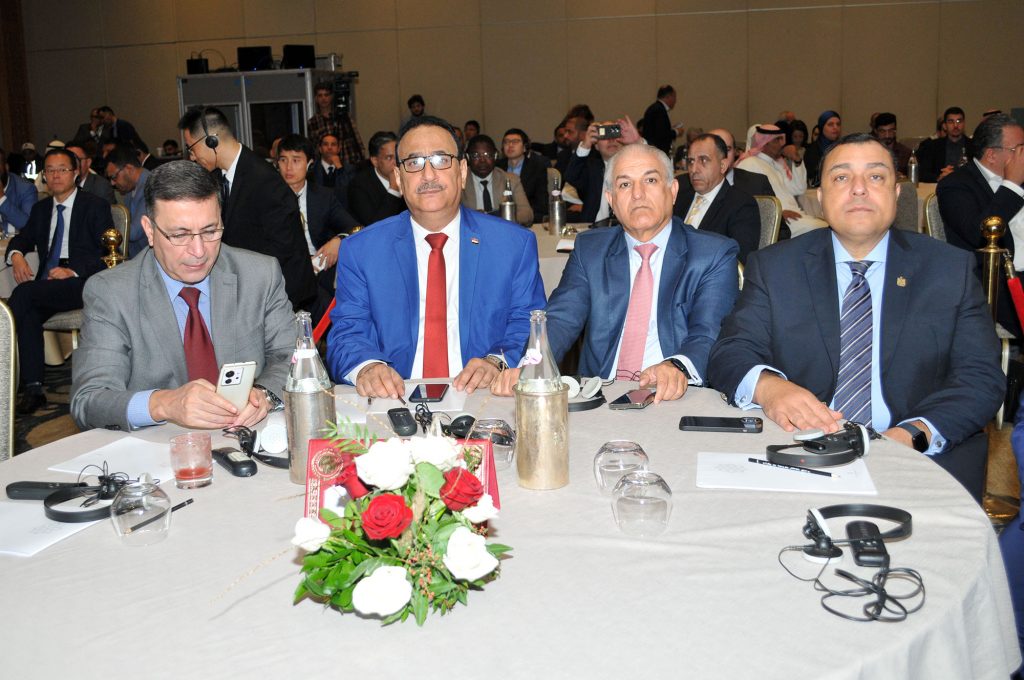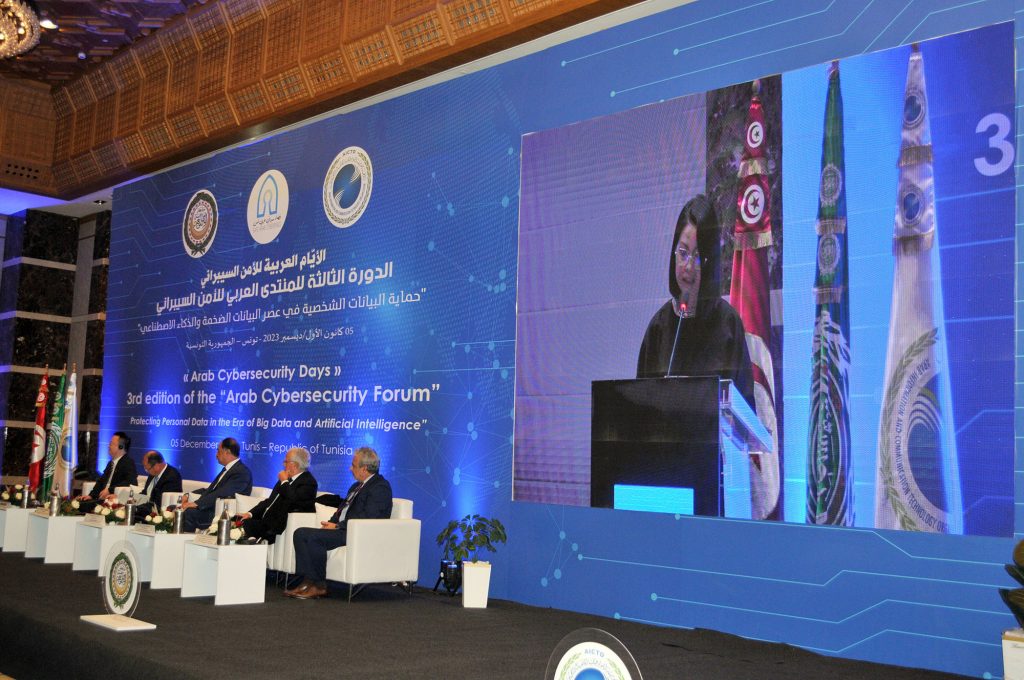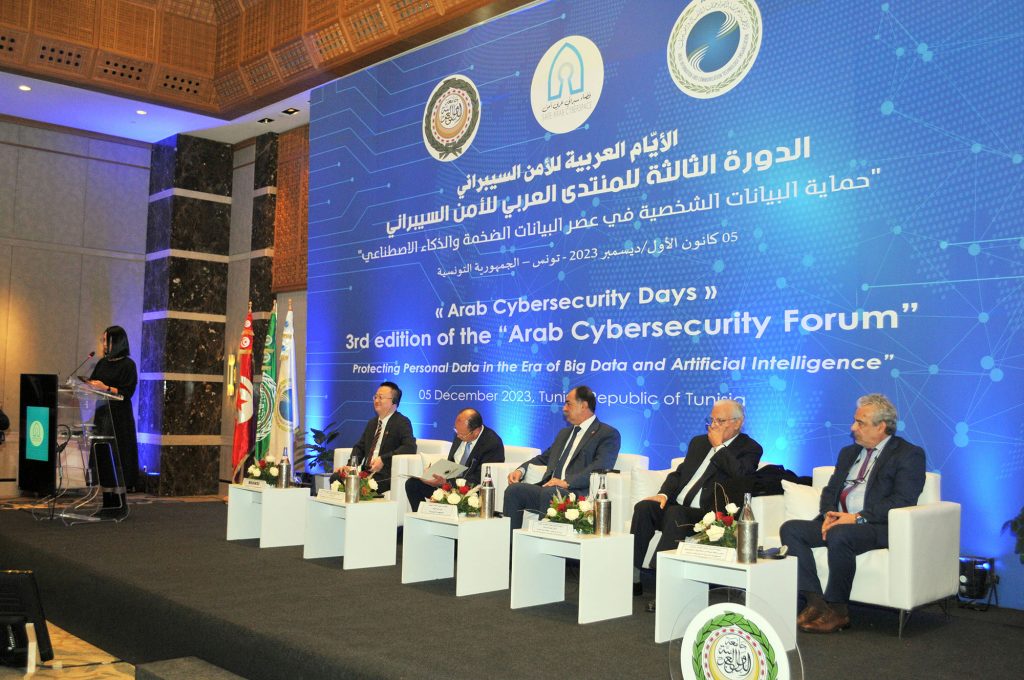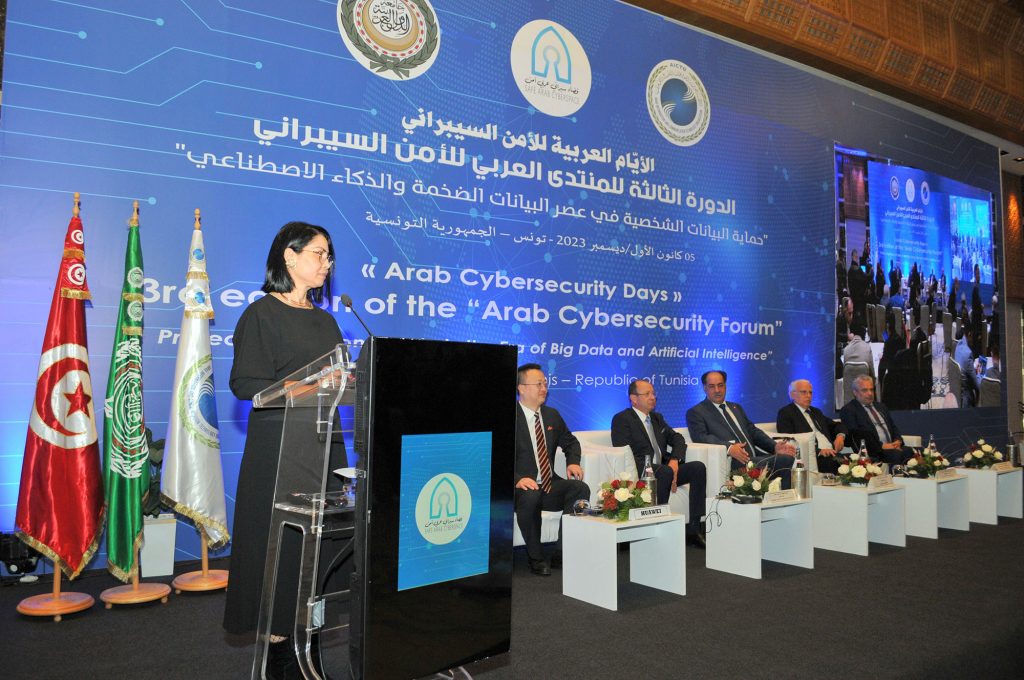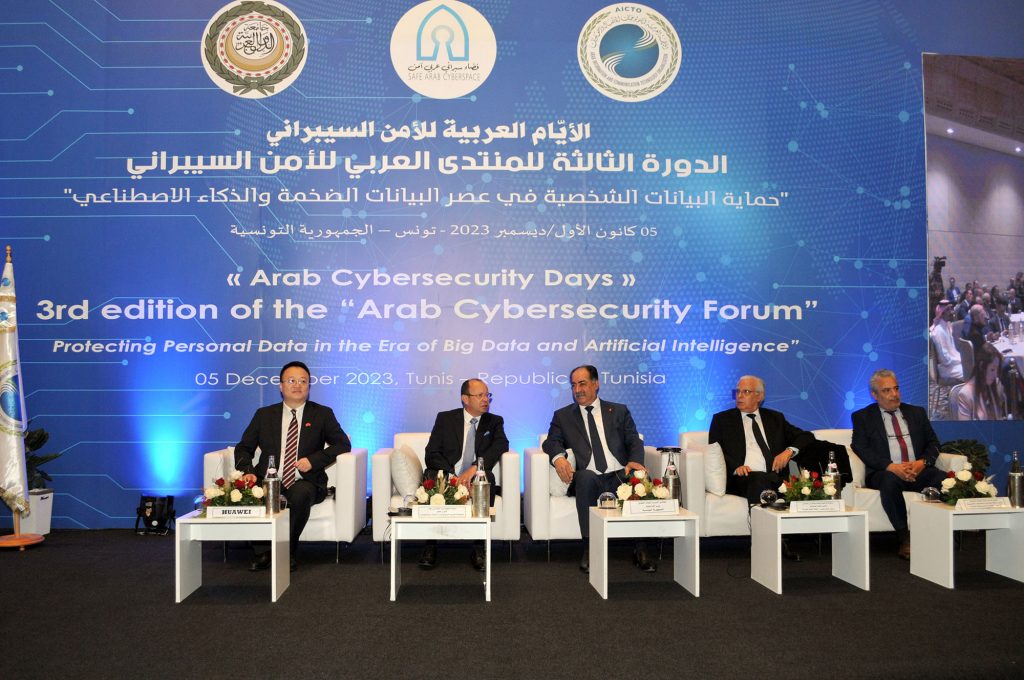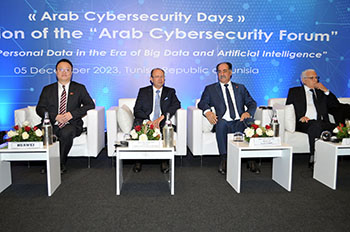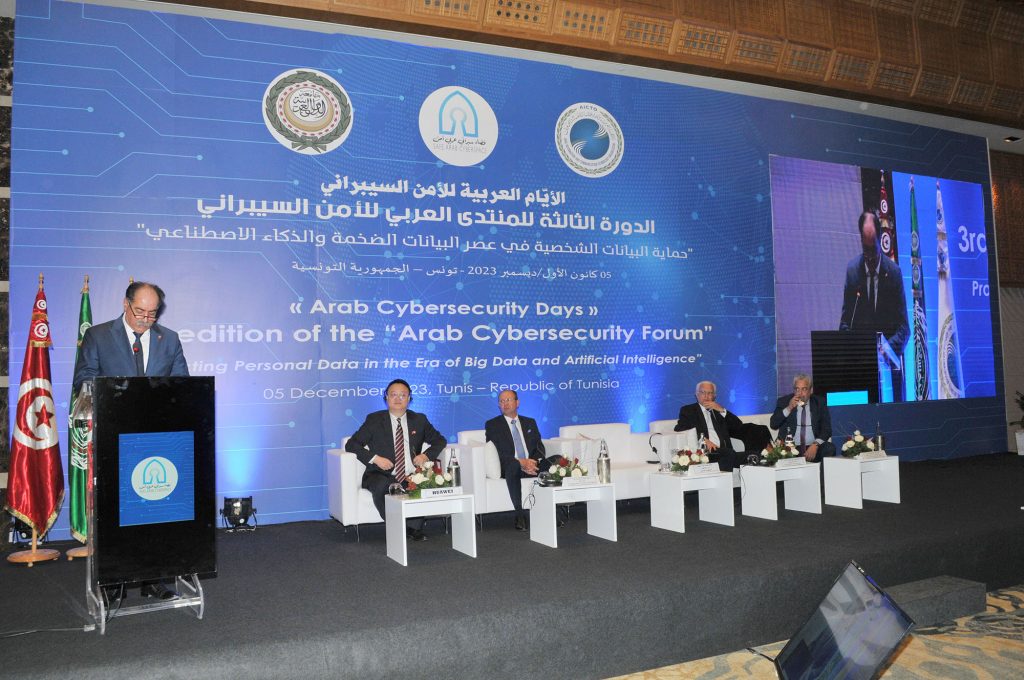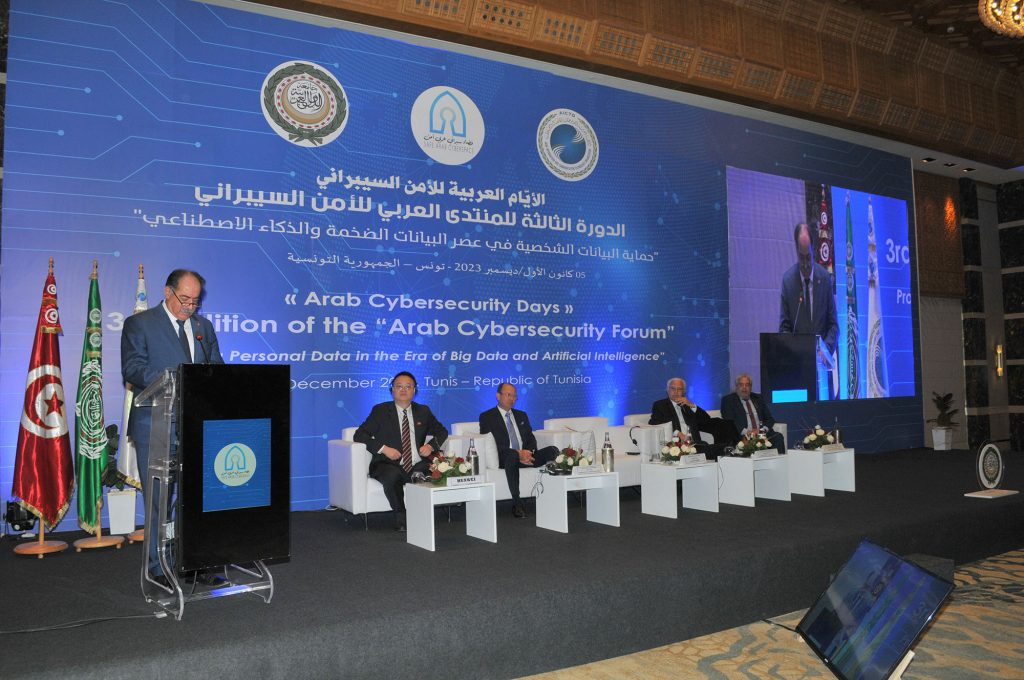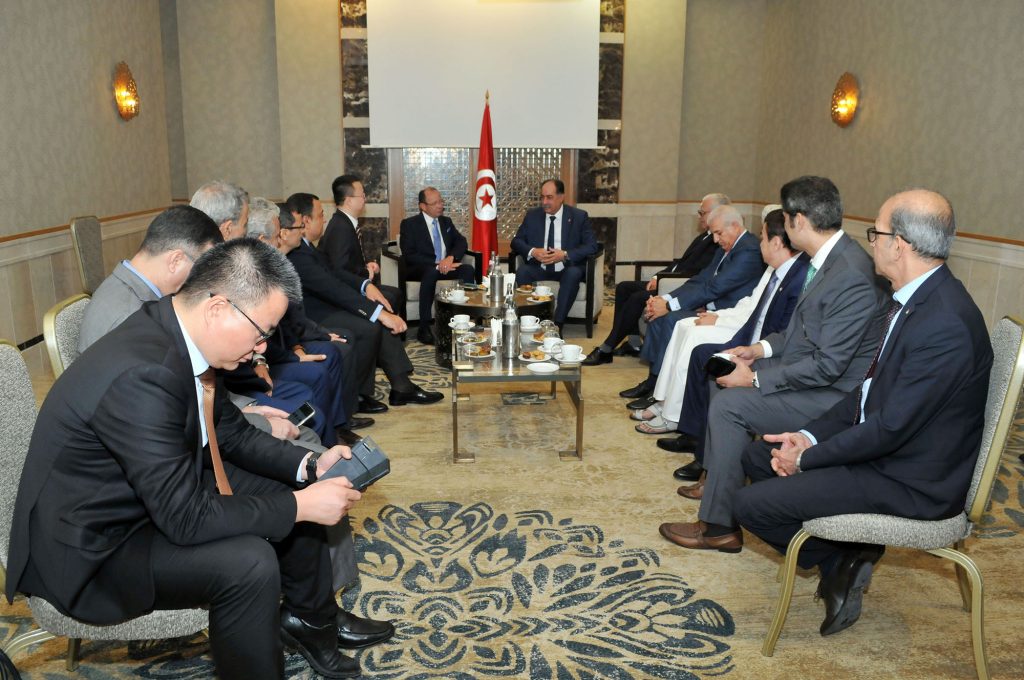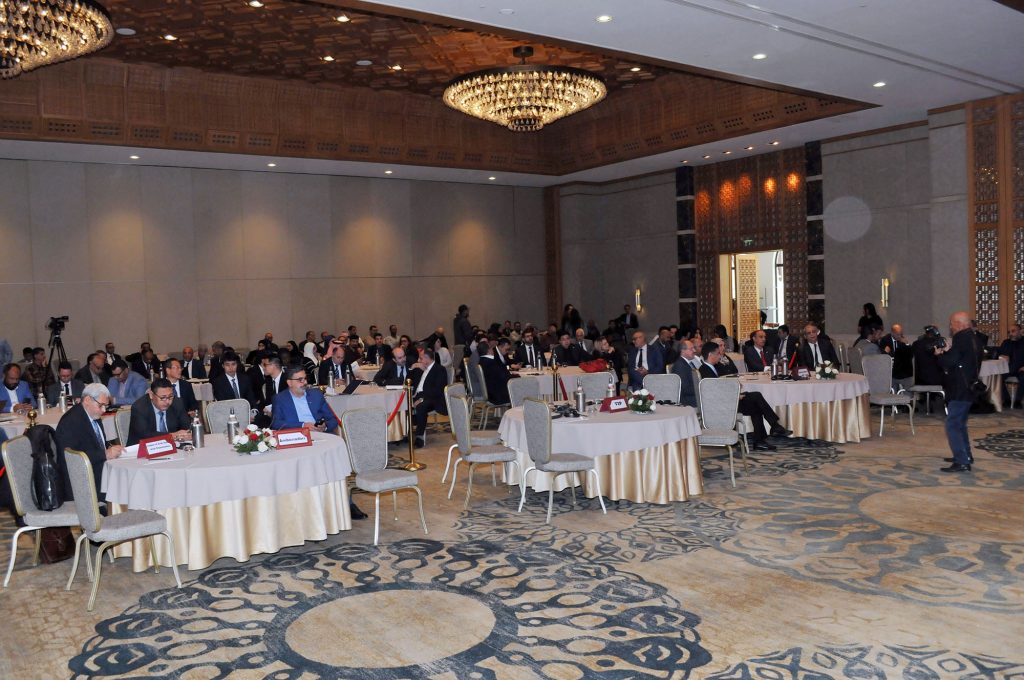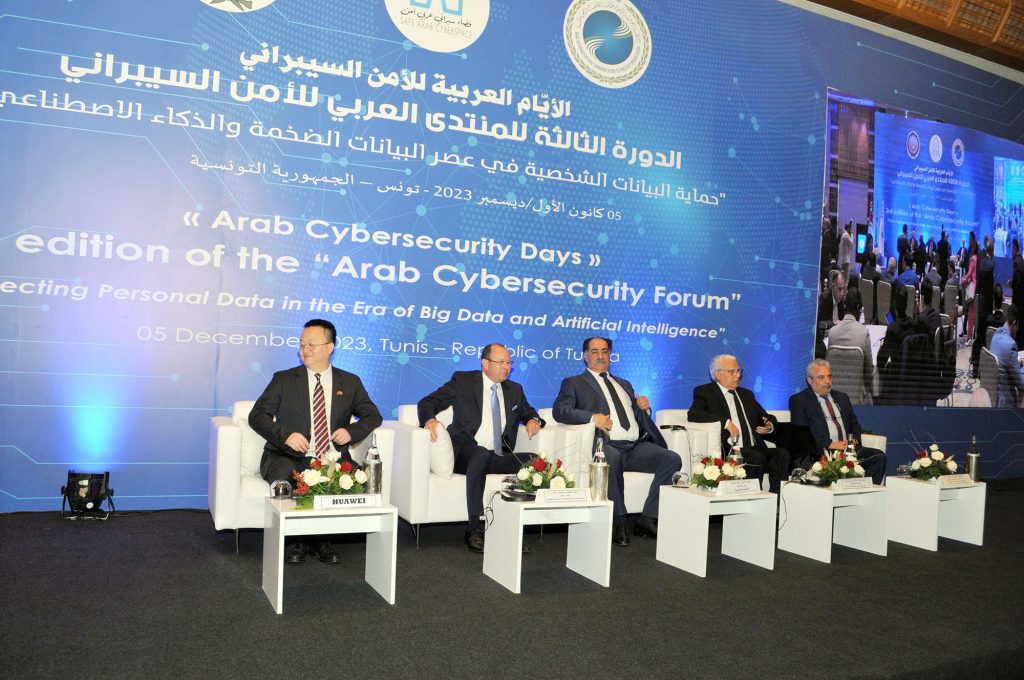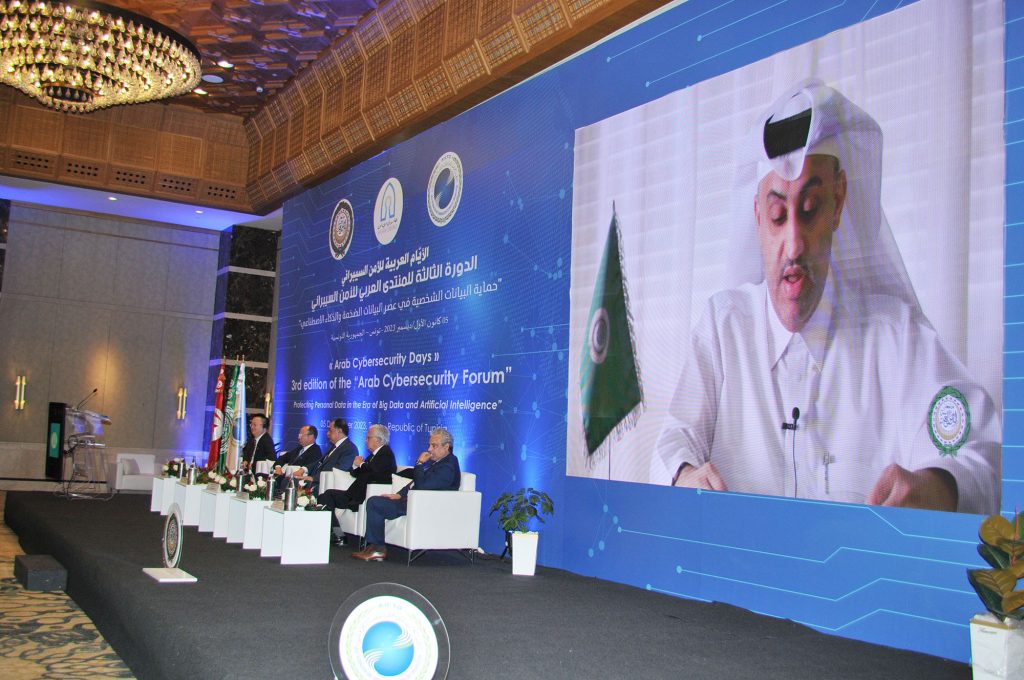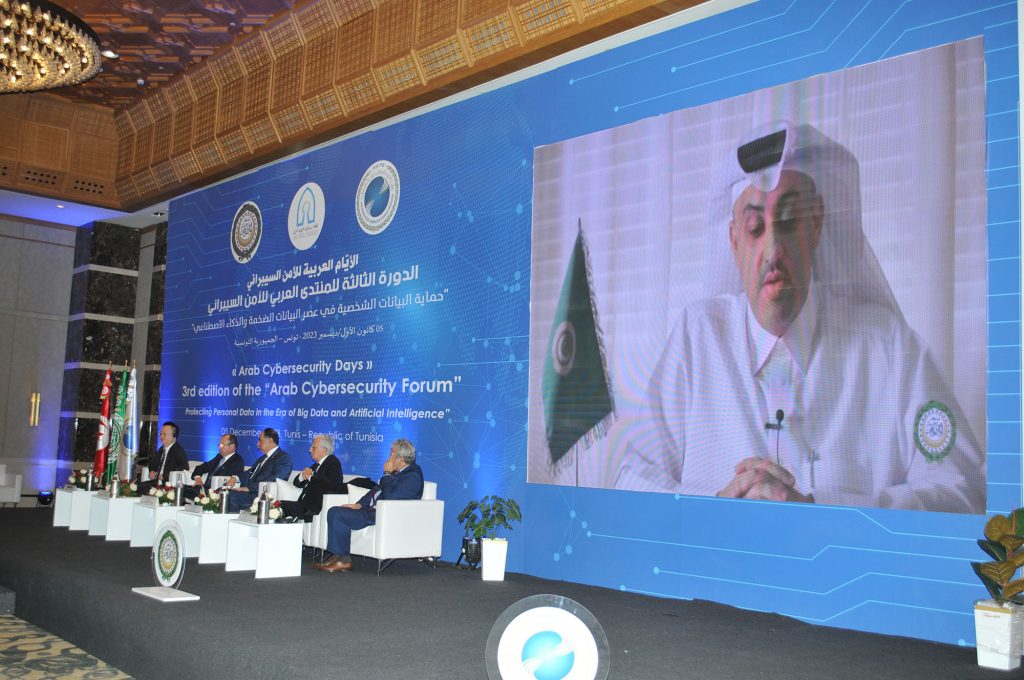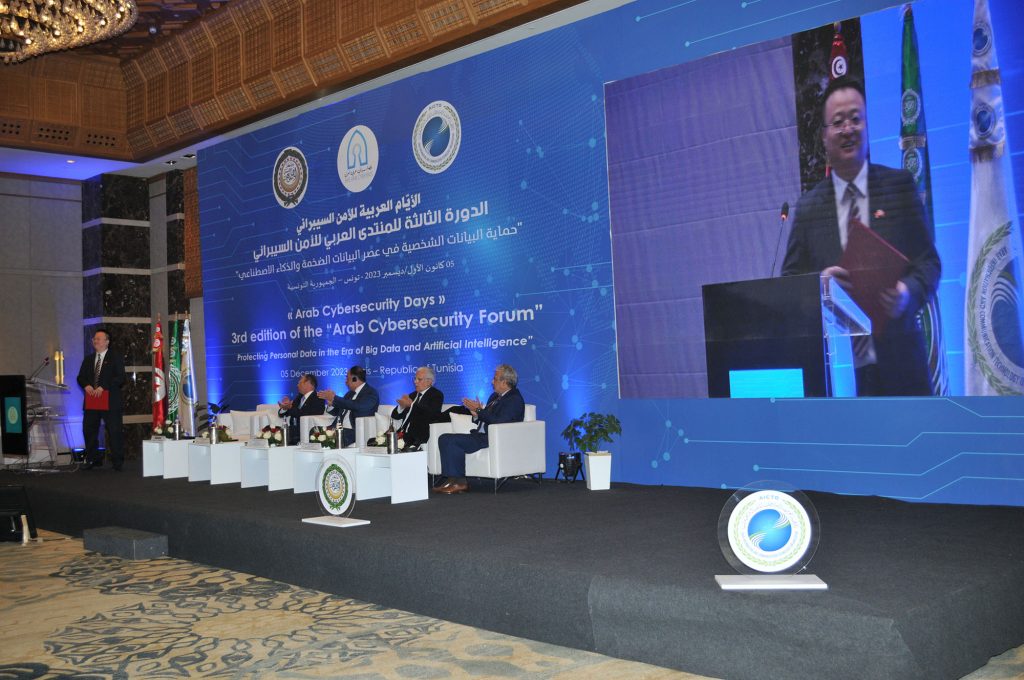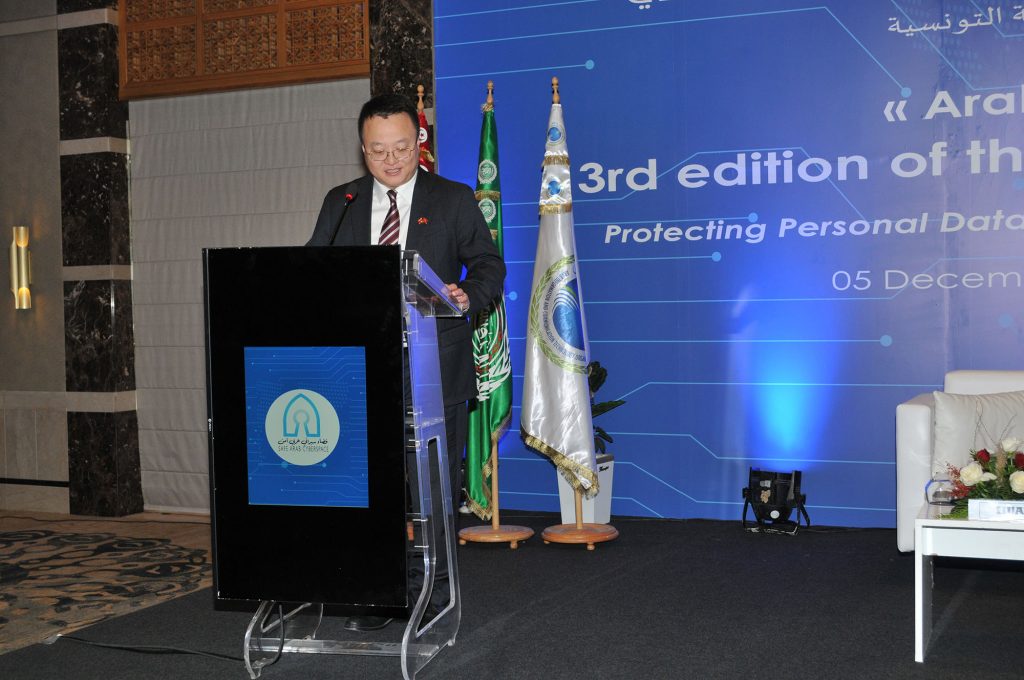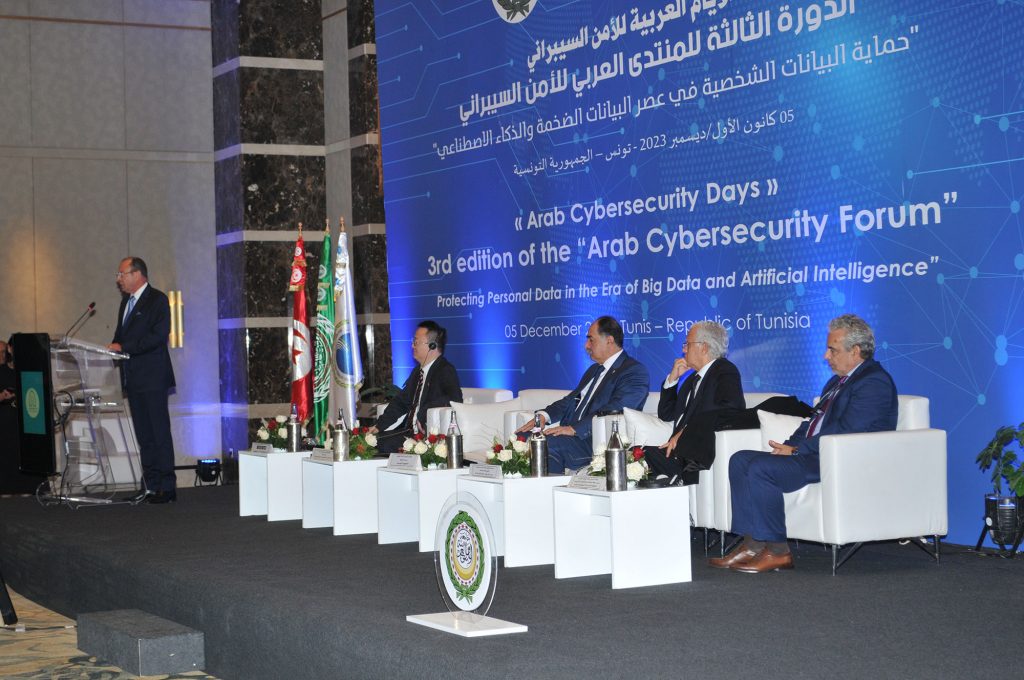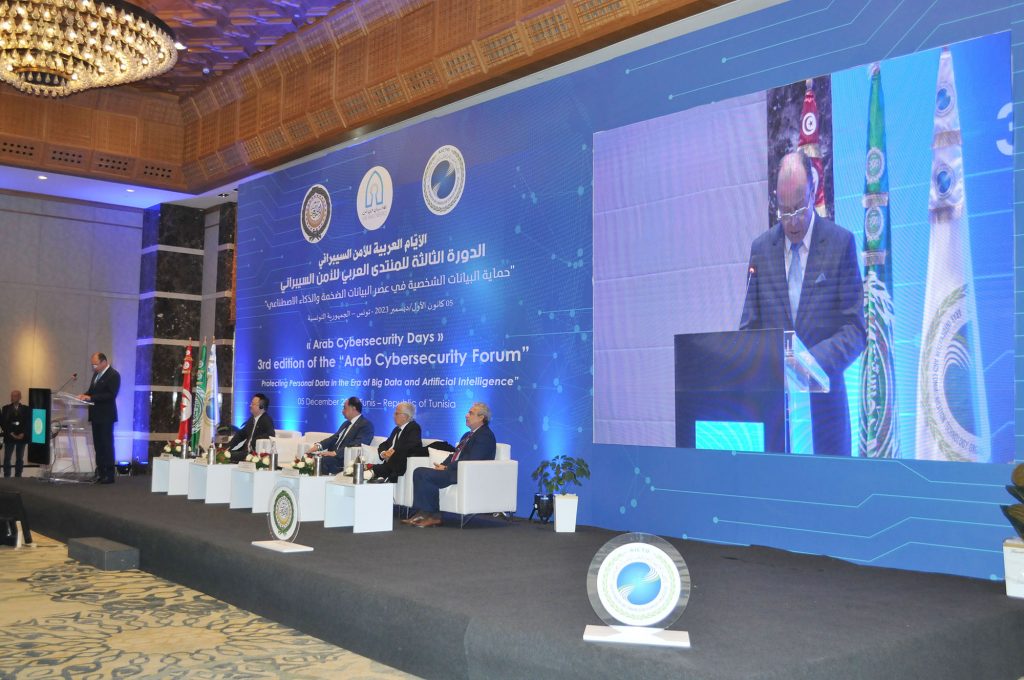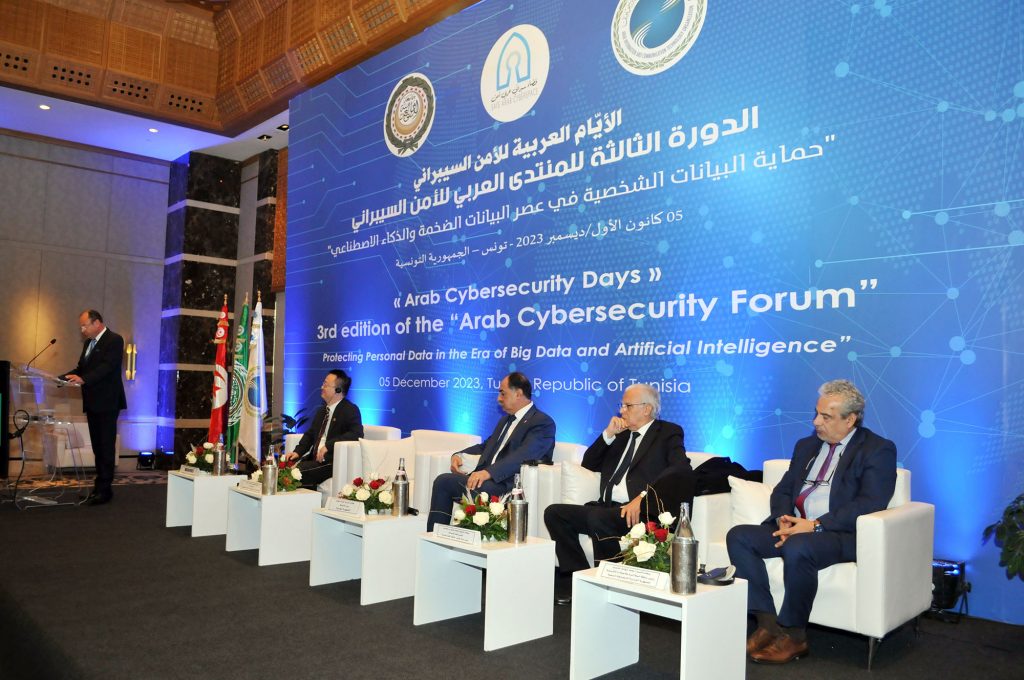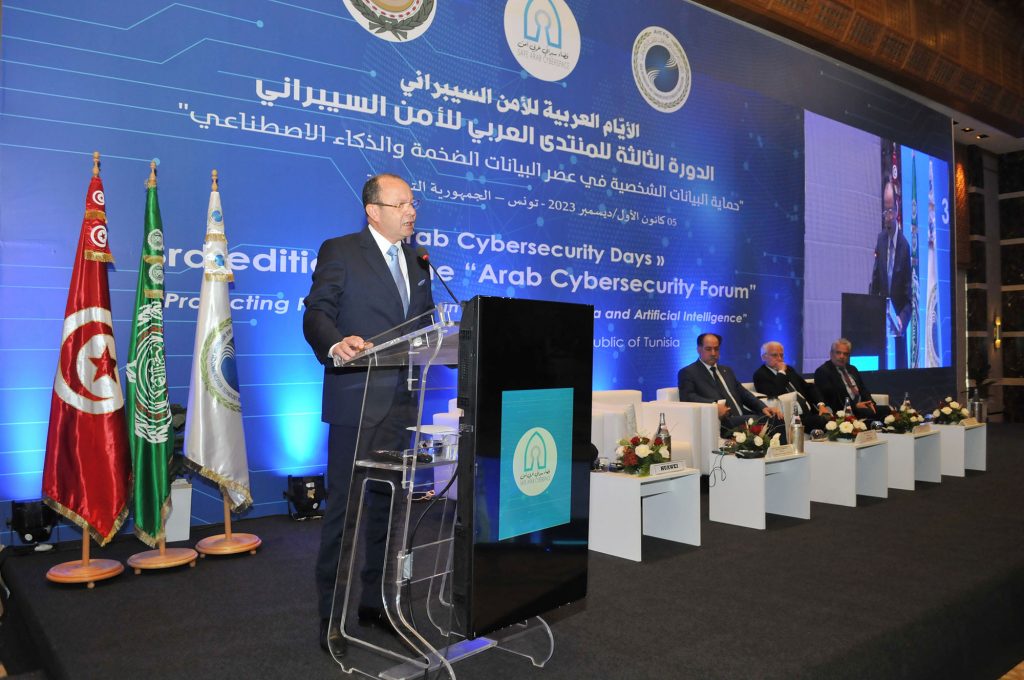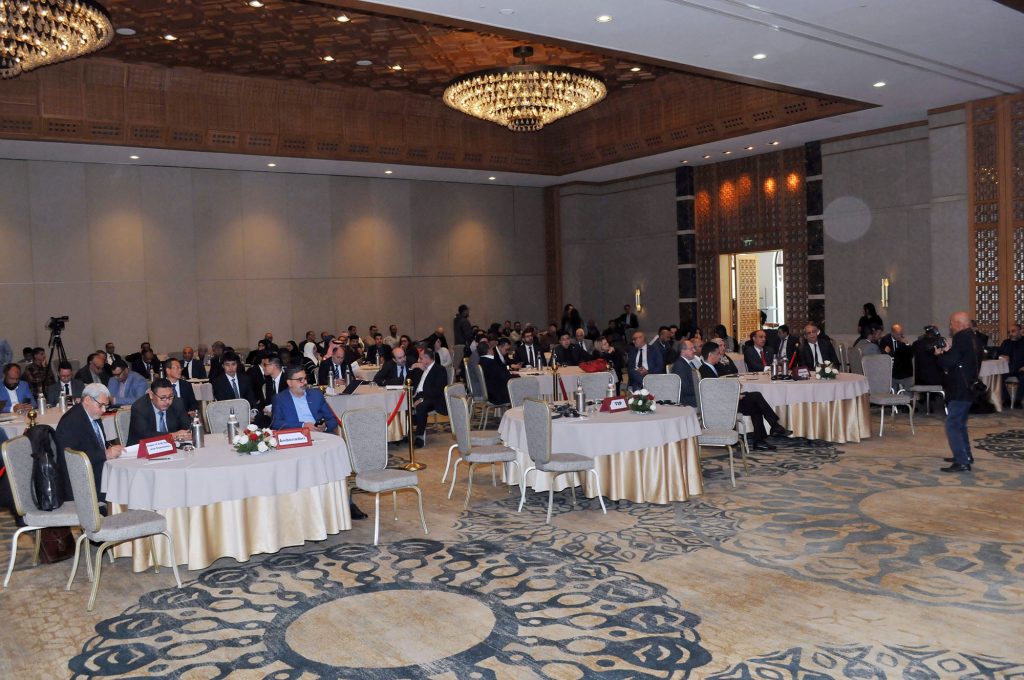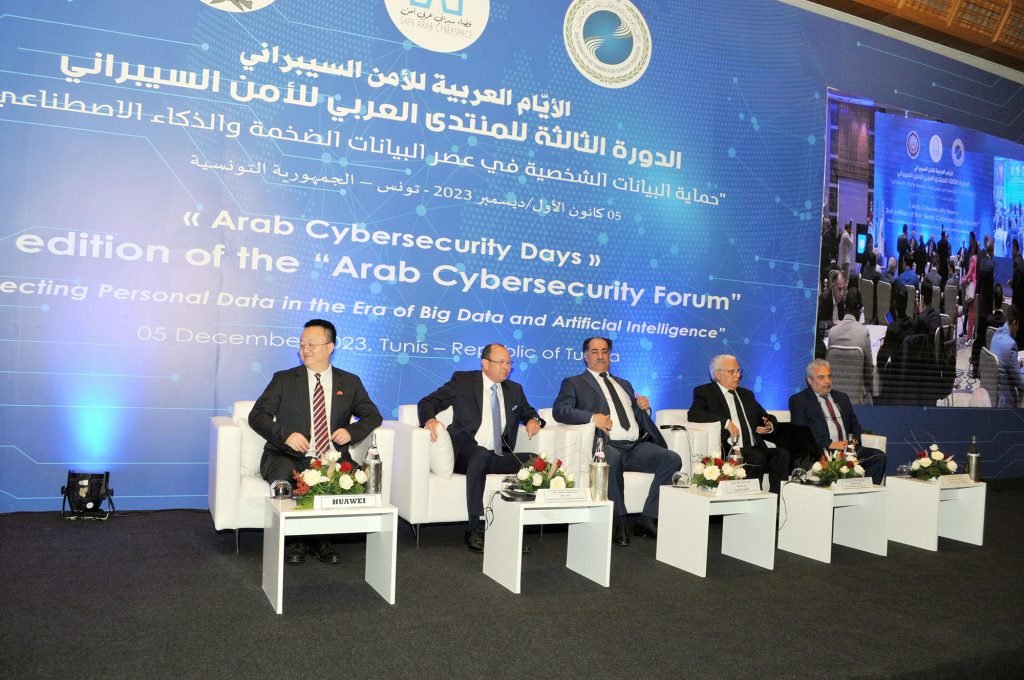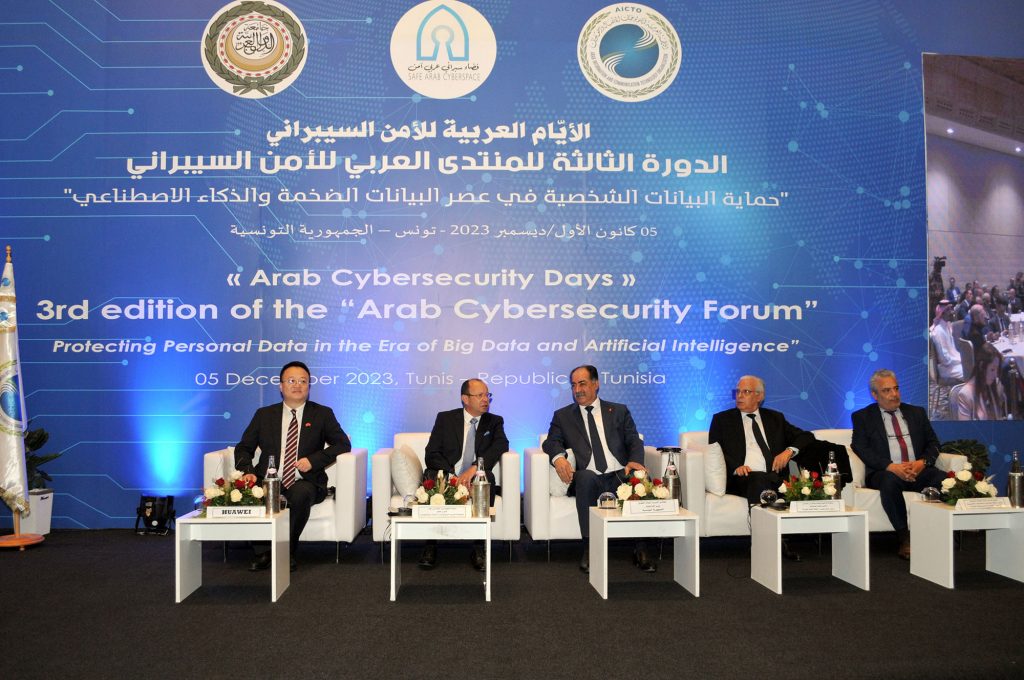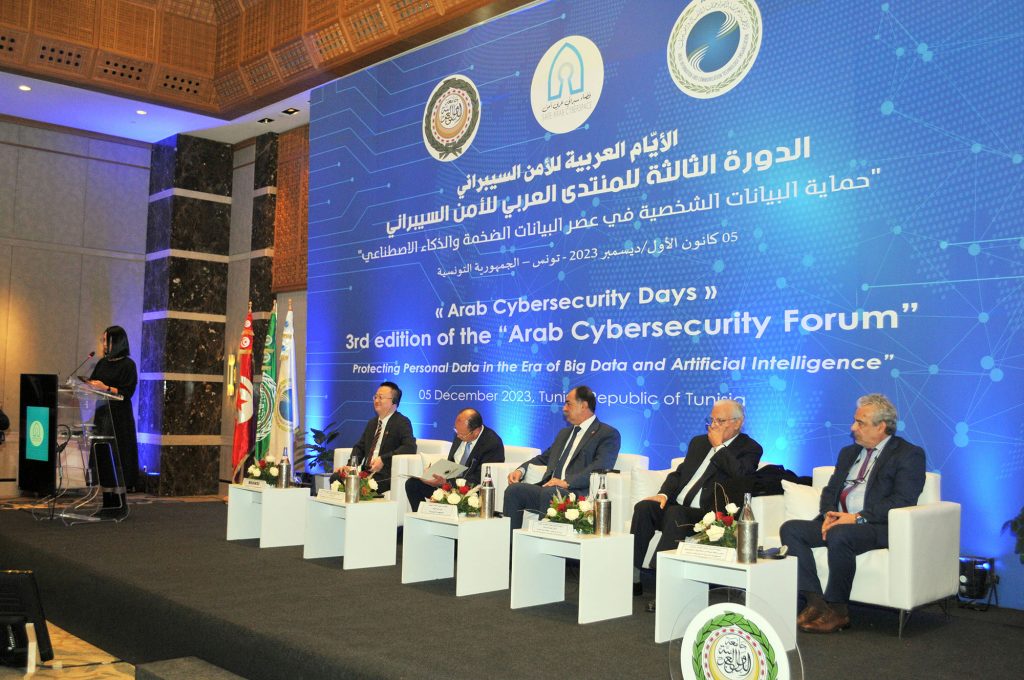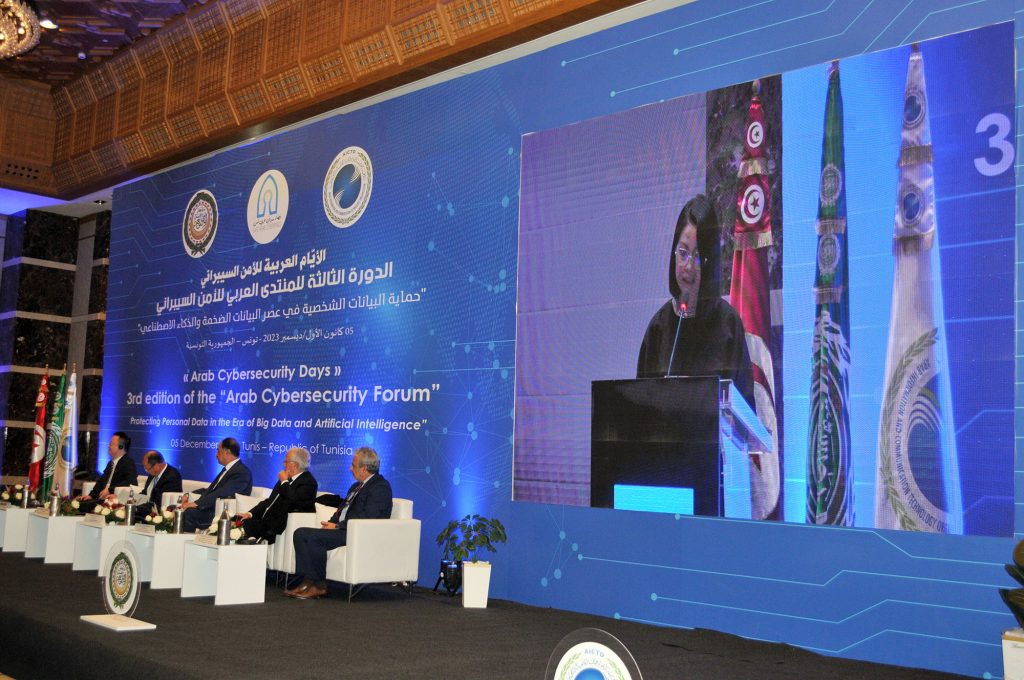
The Arab Information and Communication Technologies Organization (AICTO), in the framework of its ongoing efforts to strengthen Arab joint actions and foster regional and international cooperation in the field of digital trust and cybersecurity to support technological advancements in the Arab region, organized the “Arab Cybersecurity Days” on December 5th, 2023, at the Four Seasons Hotel Gammarth in Tunis, Republic of Tunisia.
The Arab ICT Organization dedicated the first day, December 5th, 2023, to holding the activities of the third session of the “Arab Cybersecurity Forum” under the title “Protecting Personal Data in the Era of Big Data and Artificial Intelligence.”
This important event witnessed the distinguished participation of high-level delegations from many Arab countries and the rest of the world, in the presence of His Excellency Mr. Kamal Al-Feki, Minister of Interior of the Republic of Tunisia, His Excellency Mr. Mohamed Al-Hadi Hannachi, Head of the Regulatory Authority of Post and Electronic Communications (ARPCE) of Algeria, His Excellency Dr. Mohamed Saleh Ben Issa, Deputy Secretary-General of Tunis Center of the League of Arab States, His Excellency the Ambassador Dr. Ali bin Ibrahim Al-Maliki, Deputy Secretary-General for Economic Affairs of the League of Arab States, through a recorded speech, and His Excellency Mr. Li Wenliang, General Manager of Huawei Mediterranean South Rep Office. Furthermore, distinguished directors representing Arab and regional authorities, organizations, and federations, alongside prominent cybersecurity experts from the Arab and African regions, as well as across the globe, honored the occasion with their presence.
The official opening ceremony of the “Arab Cybersecurity Forum” was held under the supervision of His Excellency Mr. Kamel Feki, Minister of Interior of the Republic of Tunisia.
- Exc. Eng. Mohamed ben Amor _ Director General of the Arab ICT Organization has inaugurated the “Arab Cybersecurity Days”, by welcoming all distinguished guests and thanking all speakers and attendees for accepting the invitation and contributing to the enrichment of this important event.
In his address, he emphasized the paramount importance of cybersecurity within the action plan of the Arab ICT Organization, affirming that: «In recent years, we’ve significantly raised our focus by initiating a dedicated ‘cybersecurity’ program under the banner ‘A Safe Arab Cyberspace.’ This initiative has been developed in collaboration with our regional and international partners. Its implementation has yielded numerous tangible outcomes, notably the introduction of the ‘Arab Cybersecurity Strategy’ in 2022. This strategy not only encompasses cutting-edge technologies such as artificial intelligence but also offers recommendations and pragmatic measures to strike a balance between technological innovation and ethical responsibilities».
Furthermore, he highlighted the significance of this third session of the Arab Cybersecurity Forum by announcing the launch of two pivotal studies:
The first study, titled “The Status of the Arab Region in the Field of Protection and Governance of personal data exchange/transfers”
The second is at the heart of the topic of this forum and is related to protecting personal data in the Arab region in light of global experiences, entitled “Vulnerability Management in the Arab Cyberspace”
And as part of its contribution to establishing an Arab Cybersecurity Market, AICTO launched the ‘Al-Farahidi Cybersecurity Contest,’ and awarded prizes to winners.
During his address, His Excellency the Minister of Interior, Mr. Kamal Al-Feki, underscored the critical strategic challenge posed by cybersecurity at the national, regional, and international levels. He emphasized the imperative for Arab nations to collaborate and harmonize their endeavors to develop comprehensive, collective solutions. This collaborative approach aims to ensure mutual success in mitigating cyber risks within an integrated participatory framework. Additionally, it requires an appropriate legislative framework, associated with the acquisition of expertise, mechanisms, and technologies to safeguard digital assets, preserve data security, and protect citizens’ privacy.
H.E. Mr. Kamal Al-Feki emphasized that, in Tunisia, countering cyber threats, establishing robust monitoring mechanisms, and maintaining preparedness to respond to imminent dangers constitute essential proactive measures. These measures are crucial to safeguard the state’s vital resources and the personal data of its citizens within the broader context of national security, encompassing security, economic, societal, and technological dimensions. This approach is part of a cohesive national strategy in the digital domain, focusing on pre-emptive actions and the prevention of cyber threats. It aims to safeguard infrastructure, systems, and data while fostering a digital culture among citizens, relying on continuous awareness and strategic vigilance across all government institutions.”
During his speech, His Excellency the Ambassador Dr. Ali bin Ibrahim Al-Maliki, Deputy Secretary-General for Economic Affairs of the League of Arab States, highlighted the significant challenges confronting many Arab countries in the realm of cybersecurity. He particularly underscored the pressing need to protect personal data for users and institutions, whether governmental or private. He emphasized the pivotal role entrusted to organizations in addressing these challenges. This involves fortifying a security framework that encompasses information and network security, data protection, and privacy. Dr. Al-Maliki emphasized the necessity of enacting legislation that criminalizes network violations, considering it a fundamental prerequisite for fostering trust among users and nurturing trust among Arab citizens in digital spaces.
Moreover, he emphasized the importance of enhancing cooperation among Arab countries in cybersecurity initiatives to ensure widespread benefits. H.E. Dr. Al-Maliki highlighted the League of Arab States’ dedicated attention to cybersecurity concerns pointing to the adoption by the last Arab summit held in Riyadh, Saudi Arabia of the Digital Agenda 2023-2030 and accelerating the adoption of the Arab Cybersecurity Strategy launched by the Arab ICT Organization by the Arab ICT Ministers’ Council in its next session during the year 2024, to include its outputs within the Arab Strategy for Communications and Information.
Then the speech was addressed by His Excellency Mr. Li Wenliang, General Manager of Huawei Mediterranean South Rep Office, he stressed the necessity of cooperation at the regional and international levels in the areas of digital trust and cybersecurity, considering its major importance to ensure the success of the ongoing digital transformations that increasingly and profoundly shape our daily lives, especially in the Arab region.
He highlighted Huawei’s commitment to developing innovative solutions while maintaining data security and its commitment to researching and developing secure technologies with the aim of providing powerful tools to protect sensitive information.
He pointed out that the rapid developments in Big Data and IA represent promising opportunities for economic and social development, but they entail great risks and challenges, especially those related to privacy, due to the rise in cyber attacks using artificial intelligence.
At the end of his speech, he called for unifying efforts between governments, organizations, and citizens to create a safe and reliable digital ecosystem. And promoting close cooperation between the public and private sectors to increase awareness of good security practices and education about cyber risks to maintain confidence in the digital economy.
The forum’s activities encompassed two sessions. The initial session provided a comprehensive overview of cybersecurity in the Arab region, delving into the latest updates on risks and gaps faced by Arab countries in the digital era. Discussions focussed on strategies for managing vulnerabilities and addressing gaps, emphasizing the intricate balance between technological advancement, security measures to counter threats and respond to incidents, and regulatory frameworks to facilitate these efforts.
This session culminated in the official launch of the white book titled “Managing and Addressing Cyber Vulnerabilities in the Arab Digital Space.”
The subsequent session focused on personal data protection amidst emerging technological trends, exploring associated risks and opportunities. It showcased strategies and achievements in this realm, examining Arab, regional, and international experiences and success stories. Insights were drawn from diverse practices and legal frameworks to glean valuable knowledge for implementing robust data protection strategies, ensuring adherence to international standards, and fostering a secure digital environment for personal data globally.
This session concluded with the unveiling of the study results titled “Protecting Personal Data in the Arab Region in Light of International Standards.”
In the ensuing session, AICTO announced the outcomes of the Al-Farahidi Cybersecurity Award, as part of the implementation of the Arab Cybersecurity Strategy.
It is noteworthy that AICTO hosted for the second consecutive time the 16th meeting of the Arab Internet Affairs Group held simultaneously with the activities of the third edition of the ‘Arab Cybersecurity Forum’.


